BY RABBI SHMUEL GOLDIN
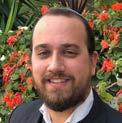


Parsha that follows (why the information is given at that particular point is the subject of another article).


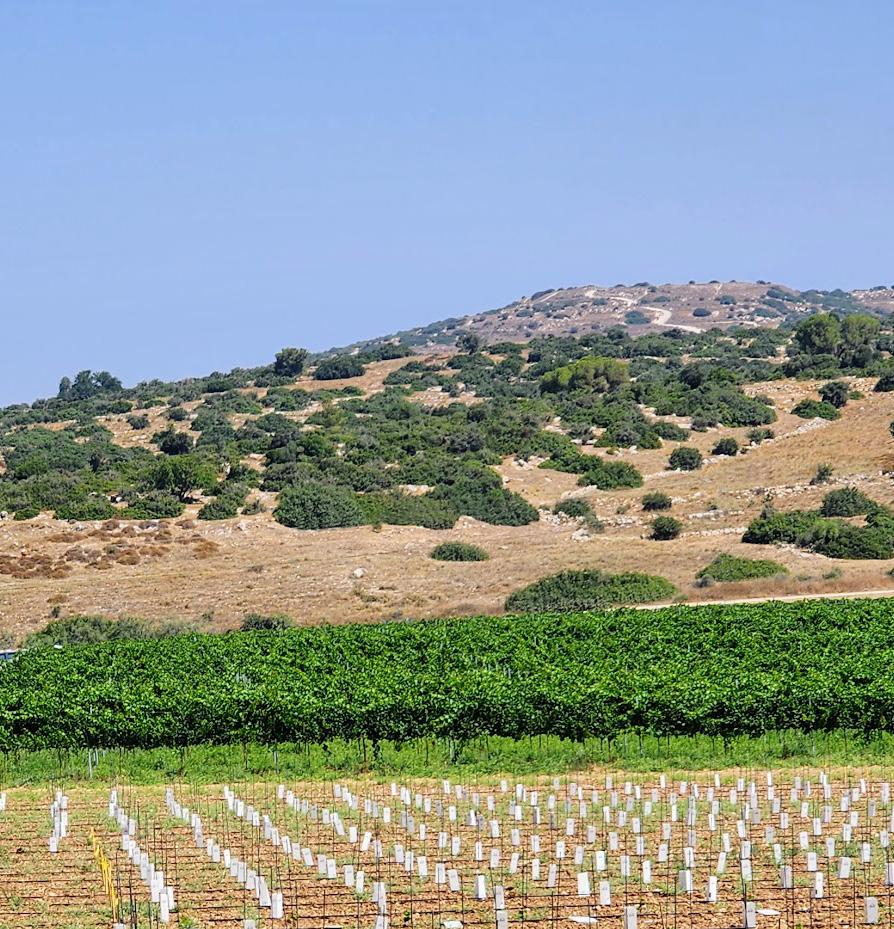

If the information concerning Moshe’s lineage is eventually shared, why is it left out in the first place?
most
Numerous commentaries address the issues before us…
YERUSHALAYIM SHABBAT TIMES PARSHAT MATOT-MASEI CANDLES 7:11PM • EARLIEST 6:18PM • HAVDALA 8:28PM • RABBEINU TAM 9:03PM ה"ב ISSUE 1524 ADVERTISING & SPONSORSHIPS 02-560-9125 TorahTidbits.com OU ISRAEL 02-560-9100 ג:ה"ל רבדמב תבשל םהל םירעה ויהו AVOT CHAPTER 2 15 JULY 2023 ▪ ג"פשת זומת ו"כ יעסמ-תוטמ תשרפ PARSHAT MATOT-MASEI Shabbat Chazak ▪ Shabbat Mevarchim SPECIAL TRIBUTE to Rabbi Sholom Gold zt"l - Page 4
to Introduce a Hero?
Is This Any Way
Working within the realm of pshat, the B'CHODSHO
OU Israel
Emeritus, Congregation Ahavath Torah, Englewood
MIDEI CHODESH Journey Into Darkness
Shmuel Goldin Page 20
prohibition
to Biblical law, food
is completely kosher and cooked by a non-
intermarriage;
early
attribute
non-Jews ents into OU KASHRUT PAGE BYRABBI EZRAFRIEDMAN Director, The Gustave for Kashrut Education OU Israel Kashrut Column Bishul Akum #3: Qualification
Ezra Friedman
46
Faculty,
Rabbi
NJ
Rabbi
Introduction to Bishul Akum The
According
that
maintain issue of lead to
others
prohibition
Rabbi
Page
Table of Contents
04 Dear Torah Tidbits Family
Rabbi Avi Berman
08 Signs of the Times
Rabbi Moshe Hauer
10 Aliya By Aliya Sedra Summary
Rabbi Reuven Tradburks
40
Science of Speech
Rebbetzin Shira Smiles
42 Kindness, Baderech
Rabbi Judah Mischel
46 Bishul Akum #3: Qualification
Rabbi Ezra Friedman
20 Journey into Darkness
Rabbi Shmuel Goldin
24 The Complexity of Human Rights
30
Rabbi Lord Jonathan Sacks zt"l
Probing the Prophets
Rabbi Nachman Winkler
32 OU Israel Schedule
38 Not Just What - But How You Say It
Rabbi Shalom Rosner
50 Our Borders Are Alive
Rabbi Moshe Taragin
54 Simchat Shmuel
Rabbi Sam Shor
56 The Y- Files Weekly Comic Netanel Epstein
58 OU-JLIC Dinah Poyurs
60 Torah 4 Teens by Teens
Dassi Zelig // Aharon Rosensweig
To View Articles by Rabbi Daniel Mann and Rebbetzin Dr. Adina Shmidman Please See: TorahTidbits.com > Individual Articles
THIS WEEK'S COVER IMAGE!
Photographed by Joel Weinberg - Joel and his wife Tova live in Jerusalem. They made Aliyah exactly 4 years ago. Joel is a doctor and started the first ever Cystic Fibrosis clinic for adults in Belenson hospital. He is a lung and intensive care specialist. The picture shows brand new vineyards being planted and growing in a place called Anava Vineyards, off highway 38, near Nechusa. It shows the greatness and beauty of Israel with its beautiful mountains and vineyards.

HELPFUL REMINDERS
Rosh Chodesh Menachem Av is on Wednesday July 19
Earliest Kiddush Levana, 3 Days After Molad: 5 Av/Sat. night July 22
7 Days After Molad: 8 Av/ Tues. night July 25
Last Opportunity to Say Kiddush Levana until: 15 Av,
until 11:22 pm
2 TORAH TIDBITS 1524 / MATOT-MASEI
רקבב עברא ירחא םיקלח רשע הששו תוקד םירשע ישילש םויב היהי בא םחנמ שדוח דלומ הבוטל לארשי לכ לעו ונילע אבה יעיבר םויב היהי בא םחנמ שדח שאר
Tues.
1,
Aug.
AND HAVDALA TIMES
CANDLE LIGHTING OTHER Z'MANIM
JERUSALEM
Ranges 11 days Wed - Shabbat
July 12 - 22 / 23 Tamuz - 4 Av
Tallit and Tefillin
-
-
- 10:24 (According to the Gra and Baal HaTanya)
All Times According to MyZmanim (20 mins before Sunset in most Cities; 40 mins in Yerushalyim and Petach Tikva; 30 mins in Tzfat and Haifa)
OU Kashrut NCSY Jewish Action JLIC NJCD / Yachad / Our Way OU West Coast OU Press Synagogue/Community Services OU Advocacy OU Israel
MITCHEL R. AEDER, PRESIDENT OF THE ORTHODOX UNION Yehuda Neuberger, Chairman of the Board, Orthodox Union | Dr. Josh Penn, OU Kashrus Commission
RABBI MOSHE HAUER, EXECUTIVE VICE PRESIDENT | RABBI JOSHUA M. JOSEPH, ED.D. EXECUTIVE VICE PRESIDENT & CHIEF OPERATING OFFICER
Rabbi Dr. Tzvi Hersh Weinreb, Exec. V.P. Emeritus
OU KOSHER: Rabbi Menachem Genack, CEO/Rabbinic Administrator OU Kosher | Rabbi Moshe Elefant, COO/Executive Rabbinic Coordinator ISRAEL: Rabbi Yissachar Dov Krakowski, Rabbinic Administrator | Rabbi Ezra Friedman, The Gustave and Carol Jacobs Center for Kashrut Education/ Deputy Rabbinic Administrator Headquarters: 40 Rector St. 4th floor, New York, NY 10006 212-563-4000 website: www.ou.org
Editor Emeritus: Phil Chernofsky
Editor: Rabbi Aaron Goldscheider | aarong@ouisrael.org
Advertising: Ita Rochel | 02-5609125 or ttads@ouisrael.org
Website: www.torahtidbits.com
Not getting enough TTs? Too many? None at all? Contact our DISTRIBUTION 050-577-2111 • ttdist@ouisrael.org
Seymour J. Abrams • Orthodox Union Jerusalem World Center • Avrom Silver Jerusalem College for Adults • Wolinetz Family Shul • Makom BaLev • Birthright • Yachad • NCSY in Israel • JLIC in Israel • Camp Dror • Pearl & Harold M. Jacobs ZULA Outreach Center • The Jack Gindi Oraita Program • OU Israel Kashrut
STUART HERSHKOWITZ, PRESIDENT OU ISRAEL
Zvi Sand / Yitzchak Fund: Former Presidents, OU Israel
| Rabbi Emanuel Quint z”l, Senior Vice President | Prof. Meni Koslowsky, Vice President
VAAD MEMBERS:

Michael Elman | Yonatan Frankel | Yitchak Fund | Daniella Hellerstein | Stuart Hershkowitz | Jeremy Lustman | Meir Raskas | Atara Reichel | Zvi Sand | Norman Schmutter | Mark Schneider | Esther Williams
RABBI AVI BERMAN, EXECUTIVE DIRECTOR, OU ISRAEL
David Katz, CFO, OU Israel | Chaim Pelzner, Director of Programs, OU Israel | Rabbi Sam Shor, Director of Programs, OU Israel Center | Rabbi Sholom Gold, Dean, Avrom Silver Jerusalem College for Adults
22 Keren HaYesod <> POB 1441 <> Jerusalem
9101032
phone: (02) 560 9100 | fax: (02) 561-7432
email: office@ouisrael.org
website: www.ouisrael.org
Founders and initial benefactors of the OU Israel Center: George and Ilse Falk a"h
Torah Tidbits and many of the projects of OU Israel are assisted by grants from THE JERUSALEM MUNICIPALITY
OU Israel, Torah Tidbits does not endorse the political or halachic positions of its editor, columnists or advertisers, nor guarantee the quality of advertised services or products. Nor do we endorse the kashrut of hotels, restaurants, caterers or food products that are advertised in TT (except, of course, those under OU-Israel hashgacha). Any "promises" made in ads are the sole responsibility of the advertisers and not that of OU Israel, the OU Israel Center , Torah Tidbits.
OU ISRAEL CENTER 3 DEVARIM MATOT-MASEI HAVDALA EARLY CANDLES HAVDALA EARLY CANDLES 8:24 6:16 7:08 8:28 6:18 7:11 Yerushalayim / Maale Adumim 8:26 6:18 7:25 8:29 6:20 7:28 Aza area (Netivot, S’derot et al) 8:25 6:17 7:26 8:28 6:19 7:29 Beit Shemesh / RBS 8:24 6:16 7:23 8:28 6:19 7:26 Alon Shvut 8:26 6:18 7:25 8:30 6:21 7:28 Raanana / Tel Mond / Herzliya / K. Saba 8:25 6:17 7:24 8:29 6:19 7:27 Modi’in / Chashmona’im 8:27 6:19 7:25 8:31 6:21 7:28 Netanya 8:24 6:17 7:23 8:28 6:19 7:26 Be’er Sheva 8:26 6:18 7:25 8:30 6:20 7:28 Rehovot 8:26 6:18 7:08 8:30 6:20 7:11 Petach Tikva 8:25 6:17 7:24 8:29 6:20 7:27 Ginot Shomron 8:28 6:19 7:16 8:32 6:21 7:19 Haifa / Zichron 8:24 6:16 7:23 8:28 6:19 7:26 Gush Shiloh 8:26 6:18 7:25 8:30 6:21 7:28 Tel Aviv / Giv’at Shmuel 8:24 6:16 7:27 8:28 6:19 7:31 Giv’at Ze’ev 8:24 6:16 7:23 8:27 6:18 7:26 Chevron / Kiryat Arba 8:26 6:19 7:25 8:30 6:21 7:28 Ashkelon 8:25 6:18 7:24 8:29 6:20 7:27 Yad Binyamin 8:26 6:17 7:20 8:30 6:19 7:23 Tzfat / Bik’at HaYarden 8:25 6:16 7:23 8:29 6:19 7:26 Golan Rabbeinu Tam
9:03PM
Week - 9:00PM
(Jerusalem) -
• Next
4:39
Sunrise 5:39
5:45 Sof Zman Kriat Shema 9:10
9:14 Magen Avraham 8:27
Sof Zman
10:21
Chatzot
Mincha Gedola
1:18 Plag Mincha 6:19
6:16 Sunset
7:47
Earliest
4:46
-
- 8:31
Tefila
(Halachic Noon) 12:43
(Earliest Mincha)
-
(Including Elevation)
- 7:43
Daf Yomi this Shabbat: Gittin 60
DEAR TORAH TIDBITS FAMILY
RABBI AVI BERMAN Executive Director, OU Israel

My Bubby and Zaidy, Shlomo & Anne Berman z"l, moved to Har Nof when I was in eighth grade. They lived in the building next to Rabbi Sholom & Bayla Gold, two buildings away from Rabbi Gold’s shul Kehilat Zichron Yoseph. At the time I was learning in Yeshiva in Kiryat Moshe and visited my grandparents often. In 1993, my family moved to Har Nof as well. Growing up in shul with Rabbi Gold, I experienced the love and attention Rabbi Gold gave every child, teenager, and adult that came to his shul, and I recall asking him shaylos to which I received beautiful and meaningful answers when I was young.
I will never forget the moment I realized that Rabbi Gold was greater than a typical shul rabbi. When I was in high school, I went to a demonstration in Tel Aviv during the Oslo Accord days. Rabbi Gold spoke at this demonstration, eloquently expressing how we should not give up any parts of the Land of Israel. Until this day, I remember Rabbi Gold stating, “You don’t obtain peace by giving up pieces of the Land of Israel.” He told the Israelis that made up the crowd the different meanings of peace. He had a way with words, a way of speaking that went straight into your kishkes, and for the first time I realized that my Bubby and Zaidy’s rabbi was a famous, great Rav.
From that day on, I felt how lucky my grandparents were to have Rabbi Gold as their Rav. Rabbi Gold gave Hespedim for my grandparents when they passed away.
When I was hired as Executive Director of OU Israel 17 years ago, Rabbi Gold came to my office the first day and said “You’re my boss,” to which I responded, “Rabbi, I’m always going to be your Talmid.” I feel blessed to have continued to develop a deep relationship with Rabbi Gold and his wife Bayla a"h, who viewed the OU Israel Center as their second home.
Rabbi Gold and Bayla founded and built OU Israel’s Avrom Silver Jerusalem College for Adults into what it is today, with tens of thousands of shiurim given over by world renowned speakers. This is due to Rabbi Gold’s belief in adult education and his belief in the importance of Talmud Torah.
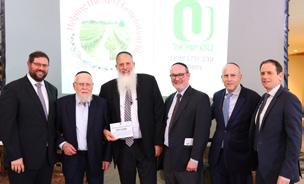
Rabbi Gold gave a shiur at the OU Israel Center every Tuesday morning. It was like
May the Torah learned from this issue of Torah Tidbits be נ”על
Sorely missed and fondly remembered by all of us
Lehman Family
4 TORAH TIDBITS 1524 / MATOT-MASEI
ל”ז ןמיל ריאמ ר”ב ןתנ ר”רה ה”נשת זומת ז”כ ע”בלנ
fire – live, exciting and dynamic. Everyone who attended that shiur – or any of the countless shiurim and Divrei Torah he gave - knows exactly what I’m referring to. Bayla was always his right hand woman, making sure that the Torah was happening and every personal and klal need Rabbi Gold had was taken care of. She also brought up the most incredible family of children, grandchildren and great grandchildren and those who married into the family, as we saw at the levaya.
I loved and will miss calling Rabbi Gold before Rosh HaShana and Yom Kippur to discuss different ideas which I could say over when speaking in shul by the tekiyot and Kol Nidrei. Those conversations and the special way Rabbi Gold taught me to look at the beauty of Torah will always stay with me.
I want to share two recent stories. The first I am grateful for and the second I regret. This past Tu B’Shvat, OU Israel honored Zvi Sand for the many years of his dedication as OU Israel President. I called Rabbi Gold and asked if he would agree to come to this event, sharing how much Zvi loves him and how much Rabbi Gold is dear to the many people who would be there. He said that it depends on the day and how he feels in the morning. I told him how much he would love coming to it. Rabbi Gold had been to so many OU Israel events over the decades, but here I was asking him to come out to Psagot in the winter. As Rabbi Gold requested, I called him the day before the luncheon, and he told me “Avi, I’m feeling
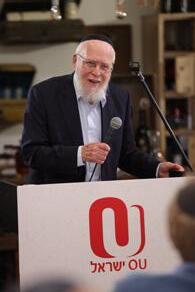
good, and I want to come.” My good friend
R’ Moishe Kempinski was honored when I asked him to please drive Rabbi Gold to the event.
Rabbi Gold told me, “Avi, if I’m coming I’m going to speak.” to which I responded, “Rabbi, you took the words out of my mouth, and we would love for you to speak.” Everyone was so excited to see him and hear him speak, as only Rabbi Gold knew how to speak with such passion and excitement. Rabbi Gold also read off the names of our raffle winners. It was incredible seeing Rabbi Gold once again full of the koach that made him Rabbi Gold.
The story I regret is that I called Rabbi Gold a couple of weeks ago and asked him to record a podcast together with me. He said, “Of course, come on over and we’ll do it.” Unfortunately, due to my travel schedule I did not have a chance to go over and do the podcast with Rabbi Gold. I still have the questions, and I will continue having the questions in my mind, that I know exactly how Rabbi Gold would answer them. I was so looking forward to hearing him say them - the rhetoric, examples, and excitement he would put into his voice. Unfortunately, now I am never going to hear him say those answers.
Condolences to
OU ISRAEL CENTER 5
םילשוריו ןויצ ילבא ראש ךותב םכתא םחני םוקמה
Rabbi & Mrs. Yaakov Iskowitz and family on the passing of his MOTHER a”h
At the levaya, we heard over an hour of such meaningful and emotional hespedim listening to the wonderful things people had to say about him. (The hespedim can be viewed on the OU Israel YouTube page in the live videos tab.) Phil Chernofsky and I were speaking after the levaya, and we both said that every nice thing people said about Rabbi Gold- that’s the way we saw him speak and behave. For me it’s a personal lesson that with passion and love, you can conquer a world.
Rabbi Gold, I publicly want to promise you that I, as I am sure many others, will B'ezrat Hashem continue to try to inspire Klal Yisrael in Eretz Yisrael and around with the fire and excitement that you passed on to us, to strengthen their connection to Israel, to G-d and to the Jewish mesorah. I stand humbled and a little embarrassed that a giant like you asked a simple person like me to please put a recommendation on his book. Rabbi Gold, you are a giant and I look forward to taking the koach that you gave me and inspiring Klal Yisrael until 120 in good health and with a lot of love.
Wishing you all an uplifting and inspiring Shabbat,

•4 rooms apartment(now 3) •109 sqm •Storage room •Shabbat Elevator


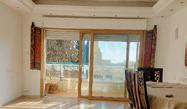
•Private Parking Spot •2 balconies
Lovely Bright & airy apartment, with lots of lights. Absolutely Prime location, near The Great Synagogue, Ben Yehuda St. & a walking distance to the Kotel. 2 balconies (1 full Sukkah), 2 full washroom, an extra service balcony.
Rabbi Avi Berman
Executive Director, OU Israel aberman@ouisrael.org
6 TORAH TIDBITS 1524 / MATOT-MASEI
- Price : 5,900,000 nis MICHAL NOAM +972-54-6108477 michalnre@gmail.com FOR SALE IN REHAVIA City Center near Yeshurun Synagogue
נ”על ל”ז םירמו ןמחנ יכדרמ תב הנשוש Shana Aranowsky Weiner a”h Upon her 36th yahrzeit - זומת ו”כ ךורב הרכז יהי Weiner, Miller, Saar & Solomont families
when what those purpose next very the heard. the to accept his is the G-d, his humility. people oppoastell My
It’s very affordable – from $500,000 with just a 15% down payment, mortgages available as well as bank guarantees. Rental income often in excess of 3.5%.

Exclusive Botanical Garden family/group tours
3 HOUR UNIQUE VIEW of JERUSALEM TREASURE
0 5 4 4 - 3 3 2 6 2 1
Info & booking: 050-6238384 gismabracha@gmail.com
Modest Swim & Casualwear www.MarSeaModest.net (NIS) www.MarSeaModest.com ($USD)

THE BEST DESIGN, ENGINEERING AND INSTALLATION OF AIR CONDITIONING SYSTEMS.


JUST ASK ANY OF OUR THOUSANDS OF HAPPY CLIENTS.

Keren Malki empowers families of children with special needs in Israel to choose home care. Donations are tax-approved in Israel, US and UK.
kerenmalki.org
02-567-0602
Honoring the memory of Malka Chana Roth ד”יה 1985-2001, killed in the Sbarro bombing.
JLEM 02-628-8282 I TLV 03-720-8000 tzviair.com
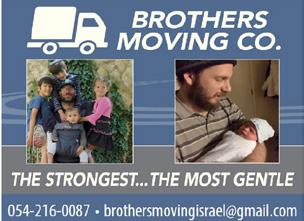






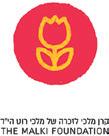
CENTER 7

OU ISRAEL CENTER 7
OU
ISRAEL
MarSea
Marci Rapp 050-424-8359
d av i d z @A s h ke l o n P r o p e r t i e s . c o m L I V E O P P O S I T E T H E S E A
g p p , y
050-573-9061 jeffmor36@gmail.com
True wholesaler from the diamond boursa with over 25 years experience member diamond dealers club Engagement Rings ∙ Stud Earrings Pendants ∙ Tennis Bracelets
www.JeffMorDiamondJewelry.com
FROM THE DESK OF RABBI MOSHE HAUER
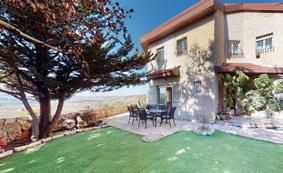
 OU EXECUTIVE VICE PRESIDENT
OU EXECUTIVE VICE PRESIDENT
Signs of the Times
All over modern Israel one finds miklat signs, directing passers-by to the nearest bomb shelter. They serve as a painful and poignant reminder of the hostile environment in which the Jewish people and Jewish state exists, “as a single lamb surrounded by seventy wolves” (Yalkut Shimoni Tehillim 35). As we have been reminded so often of late, the longest hatred – antisemitism – endures and continues to plague our people in Israel and throughout the world.
There is, however, a fascinating history to those miklat signs that significantly predates the invention of aerial bombers and long-range missiles. The Torah requires the creation of arei miklat, cities of refuge, throughout Eretz Yisrael to serve as safe havens for those who had killed someone accidentally (Bamidbar 35:9). Recognizing the threat these individuals faced from angry grieving relatives, the Torah instructed us to designate six cities spaced equally throughout the land that would provide refuge and protection for the accidental killers. The cities were not only situated conveniently; in keeping with the Torah’s instruction of tachin lecha haderech, ”prepare the way,” we were to post
miklat signs at major intersections directing people to where they could take refuge (Devarim 19:3, Rashi).
While today’s miklat signs are a sobering and painful indication of our vulnerability and serve as a tool for self-preservation from an external enemy, the original miklat signs signaled an encouraging society where we build for each other a framework for forgiveness and understanding that allows people to move past their mistakes.
Signs of the times. The day that we as a community move to build forgiveness and mutual support into the internal fabric of our society; the day that we rid ourselves of our competition, infighting, and baseless hatred, and dedicate ourselves instead to building safety and security for each other; the miklat road signs may remain but the arrows will point in a different direction. The safety and security we will build and provide for each other will provide the key to the ultimate dissolution of our many external threats.

8 TORAH TIDBITS 1524 / MATOT-MASEI
Reuven Phillips: 052-486-1006 exclusive Amazing Ramot House
Over 400 sqm corner lot. Large garden with stunning views of Jerusalem
Ahavat Chinam in Beit Tovei Hair
Rivka Ravits

So how did she do it?
Rabbi Mordechai Noygershel
Ahavat Chinam


Rabbi Shay Finkelstein

Creating a better world
Rabbi Alex Israel
Yosef & Yehuda - the pan-historic rift and reconciliation
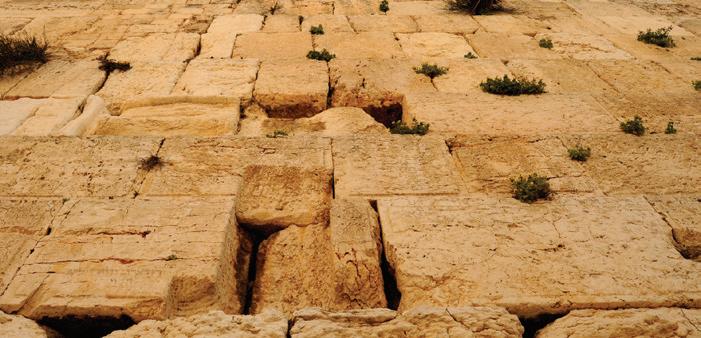
Noam Demsky

The Tarnovsky Mystery: film + lecture
24.7.23
6 AV 5783
9:00-20:30
9:00|
& Refreshments 9:45| Opening SessionRabbi Shapira & Rabbai Ullman


10:00-20:00|
Lectures
20:00|
Wrap up
If you are 70+ and independent, contact Benyamin for
OU ISRAEL CENTER 9
day of study
A
on
registering
054-4465276
at
Gathering
ALIYA-BY-ALIYA SEDRA SUMMARY
PARSHAT MATOT-MASEI

1ST ALIYA (BAMIDBAR 30:2 - 31:12)
Vows: A commitment must be kept. A young woman’s vow may be nullified by her father on the day it is taken; if not nullified, it need be observed. A married woman’s vow may be nullified by her husband; if not nullified, it need be observed. Conduct a battle of retribution on Midian, after which Moshe shall die.
1,000 soldiers per tribe are led by Pinchas accompanied by the holy vessels and trumpets. The leaders of Midian are killed, the cities destroyed. All the booty is brought to Moshe and Elazar at the plains of Moav opposite Jericho.
The book of Bamidbar is preoccupied with the march to the Land of Israel, albeit in fits and starts. But interspersed are various mitzvot. The timing and placement of these mitzvot invites explanation.
Why is the narrative of the march interrupted here with the mitzvah of honoring vows and how vows may be voided? What has just happened and what is about to happen which prompts placing the subject of vows right here?
It could be following on the tails of Bilaam. Look at how powerful words are; his curse would have damaged us. Similarly, there is power in our words to obligate us. Be careful with words. Additionally, it is foreshadowing what is about
to happen in this parsha. The tribes of Reuven, Gad and half of Menashe want to remain on the east bank of the Jordan. Moshe requires them to join in the battle for the Land and only afterwards to return to their families and possessions on the east bank. They give their word. Is their word sufficient; after all it is only their word. People lie and exaggerate. Therefore, the Torah demands of us to keep our word. And once having done so, Moshe too can rely on the word of these tribes. We may doubt the word of man; but the Torah does not. In the eyes of the Torah, a promise is a promise. And can be relied upon.
2ND
ALIYA (31:13 - 54)
Moshe is angry that the women have been spared, as they were the snares in the illicit affairs of Baal Peor. He orders their death. Elazar teaches to pass the Midianite utensils through fire and through water before use (kashering and immersing). The vast booty is divided. The soldiers receive half, the people half. The soldiers shall give 1/500th of their booty to the Kohanim; the people 1/50th to the Leviim. The booty was: 675,000 sheep, 72,000 cattle, 61,000 donkeys and 32,000 young people. The tithes were given. The leaders of the war approach Moshe: no soldier fell in the battle. We shall give all the gold and silver booty as an atonement; it numbered 16,750 shekel.
10 TORAH TIDBITS 1524 / MATOT-MASEI
RABBI REUVEN TRADBURKS RCA ISRAEL REGION

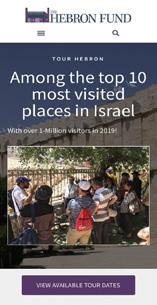








OU ISRAEL CENTER 11 Really inspiring tour! Rabbi Simcha did an amazing job! He gets so into the stories that you feel like you were there, actually making you part of history! Jennifer L We've been on this tour numerous times and always enjoy & benefit from it. This time we really appreciated the updated Beit Hadassa museum. It was really a
W moving experience. Can't wait to come back again! *Book your family favorite Hebron tour! hebronfund.org Round-trip coach bus to Kever Rachel, Maarat HaMachpela and modern Jewish Hebron neighborhoods. Let us know if your child is celebrating a Bar/Bat Mitzvah so we can make their experience even more meaningful! Contact us for General Information about Shabbat Chayei Sarah and to be included in early-bird pricing. Do n’t t a ke o u r w o r d f o r it … s ee wh a t ev er y o ne is s a yi n g ab out He b r on o n Tr ip Ad vi s o r ! Visi t t he p a r en t s i n L I V E O P P O S I T E T H E S E A d av id z @ A s h ke lo n P ro p e rt ie s .c o m c a l l D a v i d a t 0 5 4 - 4 3 3 - 2 6 2 1 w w w.a s h ke lo n p ro p e r ti e s .c o m Owning a sea-view apartment that’s close to the best beaches, shuls and new restaurants is just a phone call away! No wonder so many Anglos have already bought here! A s h k e l o n Ashkelon Summer is here!
Rivkie
The detail of the booty and its division must be for a reason, for some lesson. The booty is divided equally between the soldiers and the rest of the population. There were 1,000 soldiers per tribe, 12,000 in total. The census last week yielded a total population of 601,000. That’s not fair: 12,000 soldiers get the same as 589,000? Lesson learned: Jewish society values its soldiers, expressing profound appreciation to them with rewards for their service. The benefits that our modern Israeli society grants to soldiers who serve our country is rooted in our Torah. And while a tithe does go to the Kohanim and Leviim who provide spiritual strength, it is miniscule compared to that given to the soldiers. The Kohanim receive 1/500th of the soldier’s half. The Leviim 1/50th of the general population’s half. We appreciate the contribution of the religious leaders while appreciating more the contribution of the soldiers.
3RD ALIYA (32:1 - 19)
The tribes of Reuven and Gad have extensive flocks, while the region just conquered has lush grazing land. They requested of Moshe to settle in this spot. Moshe asked rhetorically: your brothers go to war and you sit here? You will demoralize the people as did the spies into not wanting to enter the Land. You saw G-d’s reaction in not
allowing that generation to enter the Land. The tribes of Reuven and Gad offered to house their flocks and families in place while joining the rest of the people in the battles in the Land.
The war with Midian yielded a vast booty of animals. The Bnei Reuven and Gad figure “if this land could yield such success, why not stay here?” Makes perfect sense. After all, this is economically secure and stable. It is not the same as the spies. The spies were fearful of taking the Land; which in essence was a repudiation of G-d’s promise to champion our settling the Land. These people are merely comfortable in chutz laaretz. The grass is greener on this side; why venture to the other, the unknown? They don’t question whether the Land can be taken; they question why give up the good life.
4TH ALIYA (32:20 - 33:49)
Moshe agreed to the offer of the tribes of Reuven and Gad: they would join the battle for the Land and upon its conclusion would return to the east bank of the Jordan. Moshe informed Yehoshua and Elazar of this, instructing them to ensure that all that was agreed upon be fulfilled. The lands of Og and Sichon were divided amongst Gad and Reuven, while the region of Gilad was given to half of the tribe of Menashe. (Parshat Masei) Moshe recorded all the travels until here, listing them all in great detail including that upon arrival at Hor Hahar. Aharon died at age 123 on the first of the fifth month (1 Av). The travels concluded at the plains of Moav opposite Jericho.
The acquiescence to the request of the tribes of Reuven and Gad is surprising.
12 TORAH TIDBITS 1524 / MATOT-MASEI
May the Torah & Mitzvot learned within be ל”ז המלש ןב ילתפנ רקיה יבא נ”על “Chief Taka Zees of the Gutte Neshumah Tribe” הניכשה יפנכ תחת םינש 10 Cherie
more about patient self-control than physical might. It is found in the Talmudic tractate Kiddushin 40a, where the tale is told about a certain Rabbi Zadok, who resists the attempts of a particularly powerful noblewoman to lead him astray. He exerts moral strength, and to him the Talmud applies the following biblical verse: "Bless the Lord, O His angels, mighty creatures who do His bidding, ever obedient to His bidding. Bless the Lord, all His hosts, His servants who do His will." (Psalms 103:20-21)
Why allow them to stay outside of the Land of Israel, settling in the lands of Og and Sichon? It could be that the Jewish people are conveying a message of what could be called a Newtonian law of national justice; every opposition to us, will be met with an opposition to you. Sichon and Og fought the Jewish people. And were conquered. These lands now can unequivocally be claimed as ours. Justice for nations demands that opposition not be easily forgiven. Were all the Jews to have entered the Land, this area would be resettled by the adversary. And that would be unjust. So too with the war with Midian. The national effort at seduction cannot be left unopposed. And so, the offer to settle these lands is accepted by Moshe.
JERUSALEM SALES
SHAAREI CHESSED / RECHAVIA
*Stunning Duplex! 5 bdrms (2 en suite) 25 sqm kitchen, succah, 2 parking, storage.
*Renovated 110 sqm 3 bdrms, 1st floor, succah.
*Beautiful 3 bdrm apt + 50 sqm succah balcony, shabbat elevator, parking and view.
*New 228 sqm duplex penthouse, 30 sqm succah balcony, shabbat elevator, parking and a view.
TALBIEH all on private land
*Renovated 3 bdrms, 130 sqm, succah, elevator, storage room, parking!
*Magnificent 250 sqm + 200 sqm garden.
OLD KATAMON
New 160 sqm 4 bdrms, garden, storage, parking, close to Shteblach. Occupancy - 1.5 years.
TALPIOT
4 rms, balcony, elevator, machsan, parking, view.
NACHLAOT
2 rms, priv entr, storage room, NIS 2,210,000
HAR NOF -New exclusive listing!
Central! 4 bdrms incl. 2 en suite, Pesach kitchen entrance level, option for separate unit/office.
OLD KATAMON RENTAL
3 bdrms including MB en suite, succah, parking.
5TH ALIYA (33:50 - 34:15)
Isaac's way recognizes the necessity for great patience and forbearance. If we adopt Isaac's way, we must be prepared for a lengthy process before our challenges are resolved. In the words of Rabbi Abraham Isaac Kook, words which have been memorialized in a popular song, "An eternal people does not fear the long and arduous path."
May the Torah learned from this issue of TT be in loving memory and נ"על our dear parents whose yahrtzeits are in Kislev
FOR MANY MORE PROPERTIES: 02-651-4030
Doris Weinberger a"h
Max Weinberger z”l
Greatly missed by their children, grandchildren and great grandchildren
Rav Aryeh and Dvora Weinberger
Bernie and Leah Weinberger
Menachem and Hannah Katten
Patience is necessary for those who follow Isaac's way. But a wise woman taught us that patience is but another name for hope. That woman was Jane Austen, who put these words into the mouth of one of the characters in her great novel, Sense and Sensibility: "Know your own happiness. You want nothing but patience—or give it a more fascinating name: call it hope."
On the banks of the Jordan, the people are commanded to take the Land of Israel and settle it for it is given to you. You must supplant the people of the Land for if not, they will be a thorn in your side; and inevitably, what I am commanding of you to supplant them, will be done by them to you. The borders of the Land: in the south from the Mediterranean Sea to the Dead Sea, the western border is the Mediterranean Sea north into Lebanon, the North into Syria, the east along the Jordan.
In observance of the Shloshim of our friend
SEALING SERVICES AND ROOFING

Yehuda Leib Berren z"l
Rav Menachem Weinberg will give a shiur in his memory "Heroic Joy"
Monday evening, 23 November/ 8 Kislev
7:30pm
Zoom Meeting: 853 8980 1519
Password: Yehuda
The delineation of the borders of the Land is tricky because some of the landmarks it describes are not familiar to us. Nonetheless it is clear that the southern border does not extend all the way down to Eilat. The northern border extends well into Lebanon today. And the eastern border includes much of Syria of today.
shmuelnathan4@gmail.com
OU ISRAEL CENTER 13
OU ISRAEL CENTER 15
SEALING SERVICES Beautiful, spacious 4 room luxury unit, 2.5 baths, 2 oor, Shabbat elevator, large succa terrace, storage + covered parking. Exclusive! SHELLY LANDAU PROPERTIES LTD & EVA AVIAD REALTY bayitsheli@gmail.com www.aviadrealty.com 052-385-9944 • 054-499-9043 Rehavia-Talbieh on quiet Radak
ולסכ 'ד -ה"ע המלש לאקזחי תב האל הרובד
ולסכ ז"כ -ל"ז בד ןב ךלמילא
Eiferman Properties www.eifermanrealty.comLtd.
6TH ALIYA (34:16 - 35:8)

The leaders of the tribes shall apportion the Land. The Leviim shall be given cities amongst the tribes. Each city shall have open area and grazing area surrounding it, 2,000 amot in total area outside the city. The Leviim may settle in the cities of refuge or in 48 designated cities. These cities are provided by the tribes, according to the size of the tribe and their allotted area.
The description of the open and grazing area around the city is one of the ecological passages of the Torah. Green lung around the city. 2,000 amot is about a kilometer. As the cities were small (no need for wide roads for cars in the ancient world), this amounts to a healthy greenbelt around the city.
7TH ALIYA (35:9 - 35:13)
Cities of Refuge are to be allocated, 3 on the west side of the Jordan, 3 on the east. One who kills accidentally may flee there. It is not accidental but rather murder if one attacks with a lethal weapon, or the assault is premeditated. The murderer shall be put to death; he may not flee to these cities. The relatives of the daughters of Zelophchad pointed out to Moshe that their family inheritance will be damaged. For the daughters will marry men of another
tribe; the integrity of their family allotment will be damaged. It will not even return in Yovel, for it will begin with another tribe. Moshe instructed that these women marry men from their family so as to maintain the integrity of the family allotment.
In the description of the cities of refuge, any illusion that the Jewish society in the Land will be perfect is dispelled. There will be murders; accidental and premeditated. And earlier in this parsha, we fought a battle due to the failing of sexual impropriety with the women of Midian. And earlier in the Torah, the Golden Calf and idol worship. So there you have it: the Jews of the desert have covered the big 3, idolatry, adultery and murder. We aren’t, nor do we have illusions that we will be a perfect society. But, with that full knowledge, G-d is promising us that we will enter the Land imminently. Some Jews will err, will sin, will fail. But not the Jewish people. The covenant with the people endures. Rocky at times, but enduring. The book of Bamidbar ends on the banks of the Jordan, poised to enter the Land.
ןורכז תליהק םילשורי ,ףונ רה
Kehilat Zichron Yosef
Har Nof, Jerusalem
deeply mourns the loss of its founding Mara D’Atra
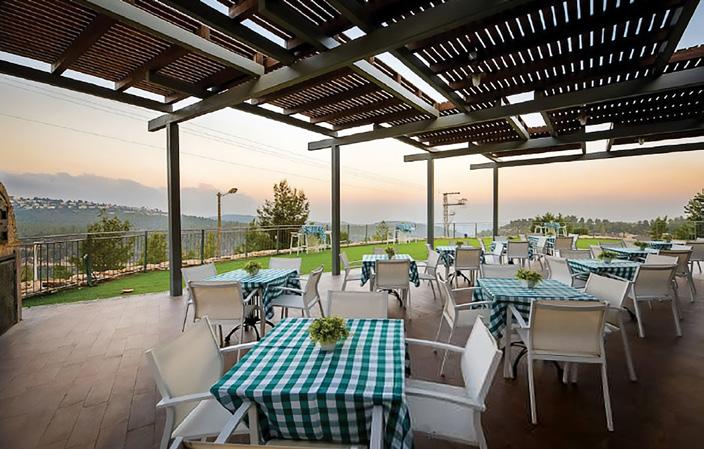
Harav Avraham Sholom Gold ל”צז
Rav Gold’s passionate, inspiring commitment and dedication to Torah, Eretz Yisrael, Medinat Yisrael and to the members of our Kehila, have made a significant difference in our lives and in the lives of Klal Yisrael
14 TORAH TIDBITS 1524 / MATOT-MASEI
ףסוי
ה”בצנת Flying Soon? Travel with Confidence 1UniTravel - Medical Insurance at great prices Choose from multiple options 1unitravel.brokersnexus.com 1UniSim - Sims for USA and Worldwide Starting at $40 sales@1unisim.com Call 077-400-3199 or USA 718-715-0001
BEAUTIFUL SPACIOUS BAKA FAMILY HOME FOR SALE
186 SQM SPLIT-LEVEL HOME WITH 80 SQM BALCONIES

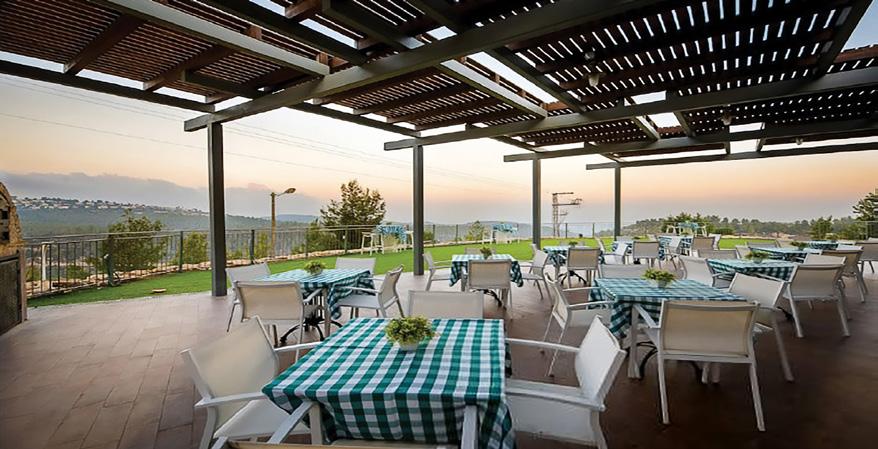
7 ROOMS, 3 FULL BATHROOMS, 2ND FL (31 STEPS), UNDERGROUND PARKING, STORAGE, EXCELLENT CONDITION, CHURCHLAND UNTIL 2077
ASKING PRICE: NIS 5,600,000
INVESTMENT OPPORTUNITY!
2 ROOM APT FOR SALE IN BUILDING UNDERGOING
TAMA 38 IN THE NEXT YEAR
HERZOG 83 ACROSS FROM THE BOTANICAL GARDENS 48M, 1ST FLOOR, CURRENTLY RENTED OUT WILL BECOME 3 RMS, 75 M WITH 2 BALCONIES
ASKING PRICE: NIS 2,050,000
www.integrityrealestate.co.il


OU ISRAEL CENTER 15 zvilapian@gmail.com Tel. 054-447-3851 Toll free UK: 0800-098-8428 US: 1-800-376-1803 Residence Professor Sinclair Rabbanut zvilapian@gmail.com Tel. 054-447-3851 Toll free UK: 0800-098-8428 US: 1-800-376-1803 Hosted Lapian Michael
zvilapian@gmail.com Tel. 054-447-3851 Toll free UK: 0800-098-8428 US: 1-800-376-1803 Join Zvi Lapian for an exceptional and relaxing SUKKOT at the NEVE ILAN Hotel in the Judean Hills Sep 29 - Oct 7 2023 Scholar in Residence Rabbi Professor Daniel Sinclair
Rabbanut zvilapian@gmail.com Tel. 054-447-3851 Toll free UK: 0800-098-8428 US: 1-800-376-1803
Smigel
Mehadrin
Hosted by Zvi Lapian & Michael Smigel
Ilana Nelson 054.5341403
Our

Be’er Tziporah a"h - Bottled Water Gemach

Walking down King George St. in Jerusalem and want a cold bottle of water?
Come help yourself to a bottle at 52 King George.
In loving memory of Yoni’s wife Tziporah a"h, a true Eishes Chayil, always full of chessed, kindness and laughter, and brought life and strength to so many people, that she touched! She was like Aron, who loved peace and pursued peace.

Yoni thanks Hashem for having the opportunity of having Tziporah in his life, to learn of her caring, patience and happiness, to overcome her challenges. May Tziporah's Neshama be a light onto the world, in a time of darkness, and may her Neshama shine to Gan Eden. Yoni misses Tziporah with tears in his eyes, as Hashem gave him a gift, a crown jewel, now he returns her to Hashem. With thanks and Toda. Love, Yoni
To help refill the supplysend tax deductible donations for Be’er Tziporah a"h Bottled Water Gemach to Chabad of RechaviaRabbi Yisroel Goldberg email Rabbi@JerusalemChabad.org 02 800-1717 www.JerusalermChabad.org/DonateShekels

16 TORAH TIDBITS 1524 / MATOT-MASEI
clinic provides cutting edge anti-aging and functional medicine techniques and treatments. We can guide you to avoid chronic illness and help you to optimize your health as you age.
you like to prevent the severe effects of aging and frailty? Dr. Barry Dinner MBBCH, ABAARM is a highly experienced physician, certified by the American Academy of Anti-Aging Medicine. 02.622.8674 info@beyoungclinics.com
Clinic VISIT OUR WEBSITE AT BEYOUNG.LIFE OUR SPECIALTIES: Cardiovascular • Hormone Stress • Gastrointestinal Ask us about our new super brain supplements ReMIND
Would
Functional Medicine
בוט יכ 'הל ודוה
STATS


and our next step will be to plant a fruit tree. I never thought of myself as being the agricultural type, but the feeling of settling and planting a portion of Eretz Yisrael, has been truly euphoric. Iy”H, when we plant our tree, and eat the fruits that will grow one day, I think we will be able to truly appreciate that unique Kedusha found in the fruit of Eretz Yisrael!
To conclude, when you buy your Tu B'shvat fruit this year, don’t search for those dried apricots and banana chips imported from Turkey. Rather, head over to the fresh produce and buy yourself some nice juicy Kedusha-filled Jaffa oranges and thank Hashem for bringing you to this land in order to be able to
OU ISRAEL CENTER 17 OU ISRAEL CENTER 75
הבוטמ עבשלו הירפמ לוכאל, imbibing that Kedusha in every bite that
you take!!
Matot Masei Both of 54 Sedras 42nd 43rdof 10 in Bamidbar 9th 10thLines in a Torah 190 189 379 Rank 29th 30th 1st Parshiyot 9 8 17 Ptuchot 4 6 10 Stumot 5 2 7 Psukim 112 132 244 Rank (Torah/Bamidbar) 24/7 12/5 1/1 Words 1484 1461 2945 Rank 29/6 32/7 1/1 Letters 5652 5773 11425 Rank 30/7 28/6 1/1 MITZVOT Matot Masei Both Mitzvot 2 6 8 Positive 1 2 3 Prohibitions 1 4 5
18 Years After The Uprooting Of Gush Katif And Northern Shomron Heroine of the movie
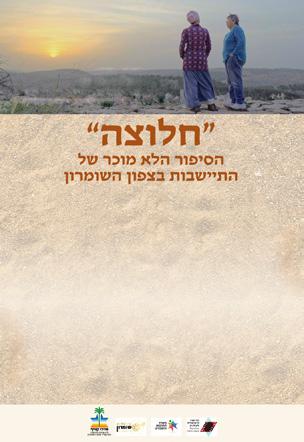
Yael Ben Yaakov
Came from the Israeli Left And, became a leader of the movement to settle the Northern Shomron.
A small Sefer Torah with its own Aron Kodesh is available to shiva houses or for any other necessary occasion on a temporary free-loan basis. If needed call Uri Hirsch 0545513173

LIFE SETTLEMENTS
Do you have a life insurance policy you:
• No longer want?
• No longer need?
• Can no longer afford the premium?
• Could you use extra money instead of keeping your policy?
I can guarantee that if you qualify with the underwriting process I can get you more money than if you cash it in with the company.
Please contact Moshe Russell at: Buymypolicy32@gmail.com
Tuesday evening, July 18 at 8 p.m. Beit Knesset Dati Leumi Rechov Chai Taib 22, Har Nof, Jerusalem
50 nis minimum donation for The Gush Katif Bride Project Shekel donations: https://tiny.cc/vaadkatif9

Dollar donations: www.all4israel.org
The program is geared for men, women and youth and will be conducted in Hebrew.
For more information: Lisa Goldenhersh - 050-575-5436
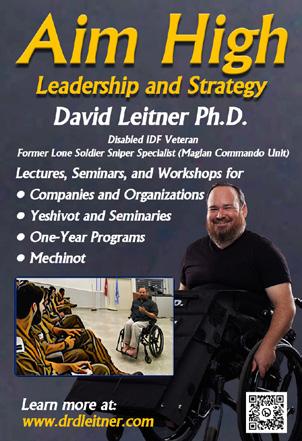
18 TORAH TIDBITS 1524 / MATOT-MASEI
Licensed (or willing to get license) in Texas
לארשי תשרומ לארשי תשרומ
Emergency Tele-Psychiatrists Needed
Call Victor 053.708.5109
"PIONEER" screening of the movie produced by Yoav Elizur Discussion with Yael Ben Yaakov
ד"סב
• 5.5 rooms on the 2nd floor
• Total area of 140 sqm


• Unique, one-of-a-kind design
• Authentic and well-preserved building

• High ceilings and abundant natural light



• Panoramic view of Jerusalem from the roof terrace

• Sukkah balcony and spacious rooms


• Mamad (sealed room) included


• Tranquil and peaceful location
• Close proximity to the Jerusalem Theater, Emek Refaim, Stiebelach, cafes, parks, and more

19 **************** RESTORE YOUR FURNITURE TO HEALTH **************** Website: www.thefurnituredoctor.co.il Email: office@thefurnituredoctor.co.il Phone: 02-999-2418 WhatsApp: 058 787 3755 125th YEAR ANNIVERSARY Do you have broken arms or legs? Is your furniture cracked or fractured but you really like it? Then now is the time to call The Furniture Doctor. 10% discount on all gluing repairs* *Valid from July 16-26, 2023 when mentioning this advertisement Real Estate | Investments | Management services NOAM HOMES Real Estate Professionals Sign up today and elevate your real estate experience! office@noamhomes.com Scan to subscribe to our NEWSLETTER Look for us: NOAM HOMES Noam Homes Even Sapir 24, Jerusalem 058-793-2222 EXCLUSIVELY FOR SALE: Spectacular Penthouse in Old Katamon PROPERTY HIGHLIGHTS:
PRICE REDUCTION! NIS 7,350,000 Brokerage fee: 2% + VAT Noa Vasl: 052-870-2387 noa@noamhomes.com WhatsApp on valuable insights and exciting opportunities in the real estate market. Sign up today and elevate your real estate experience! UNLOCK the Israeli real estate market's SECRETS. JOIN US TOMORROW IN SYDNEY, AUSTRALIA Sunday July 16th 19:30-21:30 NOW IS THE PERFECT TIME TO PURCHASE THIS PROPERTY AND TURN IT INTO YOUR DREAM HOME!
CHODESH
B'CHODSHO
BY RABBI SHMUEL GOLDIN Faculty, OU Israel Rabbi Emeritus, Congregation Ahavath Torah, Englewood NJ
BY RABBI SHMUEL GOLDIN Faculty, OU Israel Rabbi Emeritus, Congregation Ahavath Torah, Englewood NJ
BY RABBI SHMUEL GOLDIN Faculty, OU Israel Rabbi Emeritus, Congregation Ahavath Torah, Englewood NJ



Is This Any Way to Introduce a Hero?
Is This Any Way to Introduce a Hero?
Is This Any Way to Introduce a Hero?
Journey into Darkness
Context: The three-weeks from Shiva Assar B’ Tamuz through Tisha B’Av can best be understood as a passage of personal aveilut, mourning, in reverse.
With the month of Nissan upon us, we return to the story of our nation’s birth, as Moshe rises to leadership and the exodus again unfolds.
With the month of Nissan upon us, we return to the story of our nation’s birth, as Moshe rises to leadership and the exodus again unfolds.
Parsha that follows (why the information is given at that particular point is the subject of another article).
Parsha that follows (why the information is given at that particular point is the subject of another article).
If the information concerning Moshe’s lineage is eventually shared, why is it left out in the first place?
With the month of Nissan upon us, we return to the story of our nation’s birth, as Moshe rises to leadership and the exodus again unfolds.
A. Jewish law mandates that a structured cycle of mourning be observed upon the death of an immediate relative: parent, sibling, spouse, or child.
Moshe’s yearly introduction in the text, however, is cause for pause. For some reason, the Torah chooses to introduce the birth of the greatest leader we have ever knownin the most innocuous way possible.
Moshe’s yearly introduction in the text, however, is cause for pause. For some reason, the Torah chooses to introduce the birth of the greatest leader we have ever knownin the most innocuous way possible.
Moshe’s yearly introduction in the text, however, is cause for pause. For some reason, the Torah chooses to introduce the birth of the greatest leader we have ever knownin the most innocuous way possible.
Designed to move the mourner from a point of deep sadness to a full reentry into society , the laws of aveilut delineate a series of graded periods of mourning.
“And a man went from the House of Levi and he took a daughter of Levi. And the woman conceived and gave birth to a son.”
“And a man went from the House of Levi and he took a daughter of Levi. And the woman conceived and gave birth to a son.”
“And a man went from the House of Levi and he took a daughter of Levi. And the woman conceived and gave birth to a son.”
While a full discussion of these intervals is beyond the scope of this study, the stages of aveilut can be summarized in brief, as follows:
Questions abound:
Questions abound:
Why does the Torah depart from its usual mode of describing an individual’s birth?
Parsha that follows (why the information is given at that particular point is the subject of another article).
If the information concerning Moshe’s lineage is eventually shared, why is it left out in the first place?
If the information concerning Moshe’s lineage is eventually shared, why is it left out in the first place?
Numerous commentaries address the issues before us…
Numerous commentaries address the issues before us…
Numerous commentaries address the issues before us…
the mourner is to remain in the shiva home, sit on the floor or a low seat; wear the same outer garments each day; receive consolation from family and friends. Activities prohibited during this period include: shaving and haircuts; nail cutting; washing for pleasure; participation in joyous events and gatherings.
Working within the realm of pshat, the Ibn Ezra suggests that, at the time of Moshe’s birth, the Israelites lived in many cities in Egypt. Through the phrase, “And a man went,” the Torah is simply informing us that Amram “went” from one Egyptian city to another in order to marry Yocheved.
Working within the realm of pshat, the Ibn Ezra suggests that, at the time of Moshe’s birth, the Israelites lived in many cities in Egypt. Through the phrase, “And a man went,” the Torah is simply informing us that Amram “went” from one Egyptian city to another in order to marry Yocheved.
Working within the realm of pshat, the Ibn Ezra suggests that, at the time of Moshe’s birth, the Israelites lived in many cities in Egypt. Through the phrase, “And a man went,” the Torah is simply informing us that Amram “went” from one Egyptian city to another in order to marry Yocheved.
Shloshim, a thirty-day period, beginning with the day of burial: Activities prohibited during this period include: Shaving and haircuts; nail cutting; laundering and wearing freshly laundered clothes; participation in joyous events and gatherings.
Perhaps the Ibn Ezra intends to emphasize that Yosef’s plan for his family’s descent into Egypt has, by this point, broken down. Originally meant to remain separate from the Egyptians in the land of Goshen, the Israelites are assimilating into their surroundings.
Yud-Bet Chodesh, a year-long period of mourning, observed upon the death of a parent. Activities prohibited during this period include: participation in joyous events and gatherings; the purchase and wearing of new clothing.
Perhaps the Ibn Ezra intends to emphasize that Yosef’s plan for his family’s descent into Egypt has, by this point, broken down. Originally meant to remain separate from the Egyptians in the land of Goshen, the Israelites are assimilating into their surroundings.
Perhaps the Ibn Ezra intends to emphasize that Yosef’s plan for his family’s descent into Egypt has, by this point, broken down. Originally meant to remain separate from the Egyptians in the land of Goshen, the Israelites are assimilating into their surroundings.
Why does the Torah depart from its usual mode of describing an individual’s birth?
Questions abound:
Why does the Torah depart from its usual mode of describing an individual’s birth?
What does the seemingly superfluous phrase “and a man went…” indicate?
What does the seemingly superfluous phrase “and a man went…” indicate?
What does the seemingly superfluous phrase “and a man went…” indicate?
Why does the Torah omit any mention of Moshe’s lineage- to the point where even the names of his parents are deliberately omitted?
Aninut, the period of deepest mourning, from death until burial: Activities prohibited during this period include: the consumption of meat and wine; shaving and haircuts; nail cutting; washing for pleasure; participation in joyous events and gatherings.
Why does the Torah omit any mention of Moshe’s lineage- to the point where even the names of his parents are deliberately omitted?
Why does the Torah omit any mention of Moshe’s lineage- to the point where even the names of his parents are deliberately omitted?
Above all, is this any way to introduce a hero?
The Ramban, however, takes issue with the Ibn Ezra’s interpretation, arguing that the Torah would have no reason to inform us concerning a journey taken by Amram from one city to another.
B. Upon the arrival of the Three Weeks, however, Jewish tradition is presented with a challenge that is the mirror-image of the challenge posed in a case of personal mourning.
The Ramban, however, takes issue with the Ibn Ezra’s interpretation, arguing that the Torah would have no reason to inform us concerning a journey taken by Amram from one city to another.
The Ramban, however, takes issue with the Ibn Ezra’s interpretation, arguing that the Torah would have no reason to inform us concerning a journey taken by Amram from one city to another.
Above all, is this any way to introduce a hero?
Above all, is this any way to introduce a hero?
Compounding these questions is the fact that the omitted information concerning Moshe’s lineage is ultimately included in the
In addition, the mourner is exempted from the performance of positive mitzvot such as prayer and the recitation of blessings.
Compounding these questions is the fact that the omitted information concerning Moshe’s lineage is ultimately included in the
Compounding these questions is the fact that the omitted information concerning Moshe’s lineage is ultimately included in the
Shiva, a seven-day period, beginning with the day of burial: During this interval
Instead, maintains the Ramban, the verb lalachet, “to go,” is often used in the text when a new and difficult step is about to be taken. By stating, Veyeilech ish, “And a man went,” the Torah underscores Amram’s courageous willingness to marry in spite of Pharaoh’s harsh decrees.
Rabbi Joseph Soloveitchik describes the distinction between the two journeys as the difference between Aveilut Chadasha, “new mourning,” and Aveilut Yeshana , “ancient mourning.”
Instead, maintains the Ramban, the verb lalachet, “to go,” is often used in the text when a new and difficult step is about to be taken. By stating, Veyeilech ish, “And a man went,” the Torah underscores Amram’s courageous willingness to marry in spite of Pharaoh’s harsh decrees.
Instead, maintains the Ramban, the verb lalachet, “to go,” is often used in the text when a new and difficult step is about to be taken. By stating, Veyeilech ish, “And a man went,” the Torah underscores Amram’s courageous willingness to marry in spite of Pharaoh’s harsh decrees.
The Ramban’s approach connects to a
The Ramban’s approach connects to a
The Ramban’s approach connects to a
When an immediate relative dies, Aveilut Chadasha is triggered. Halacha encounters family members who are suddenly thrust into the depths of personal distress.
20 TORAH TIDBITS 1524 / MATOT-MASEI
16 TORAH TIDBITS 1509 / VAYAKHEL - PEKUDEI 5783
B'CHODSHO
MIDEI CHODESH 16 TORAH TIDBITS 1509 / VAYAKHEL - PEKUDEI 5783
B'CHODSHO
MIDEI CHODESH TORAH TIDBITS 1509 / VAYAKHEL - PEKUDEI 5783
MIDEI
A “new” situation has emerged that has changed their lives. The task of the law, therefore, as indicated above, is to guide those mourners from that “new” point of deep sorrow to a full reentry into society. Throughout the journey, the memory of their loved one is carried with them, as they are slowly consoled from their paralyzing grief.
In contrast, as the Three Weeks approach, Jewish tradition faces a nation that is not in any pain at all. The destruction of the Temples and the ensuing tragedies of Jewish history are far from our minds, as we engage in the activities of daily life.
At this point in the calendar, therefore, Halacha confronts the challenge of Aveilut Yeshana, personal mourning in reverse: How can a nation be moved to mourn an “ancient” loss?
How can a people be moved from a point of comfort and full function, to a point of deep sadness and pain?
C. Meeting this challenge head-on, Jewish laws and customs have developed over time, providing a solution that is elegant in its simplicity.
If the laws of personal aveilut provide the mourner with a step-by-step behavioral journey from pain to comfort, the laws and customs of the three-weeks will create a similar journey, but from comfort to pain.
The logic of these journeys will be the same; only the trajectory will vary.
The laws of personal mourning acknowledge that an individual cannot be moved from one extreme to the other; that the journey towards consolation must unfold in stages.
So, too, the customs of the Three Weeks do not demand immediate change. Instead, each individual is taken by the hand on a “journey into darkness.”
D. Because the laws and customs governing the Three Weeks emerge later in Jewish tradition, practices vary from community to community. In brief, these practices can be summarized as follows:
The Three Weeks: The entire period from Shiva Assar B’ Tamuz through Tisha B’Av. Ashkenazim and some Sephardim refrain from: the performance of weddings, haircuts, joyous music, dancing, purchasing or eating items that will require the recitation of the shehecheyanu blessing.
The Nine Days: From Rosh Chodesh Av through Tisha B’Av.
The Mishna states, “With the arrival of the Month of Av, we curtail out joy.”
Ashkenazim and some Sephardim

OU ISRAEL CENTER 21
Your Jewelry is Worth Gold! @Fancycolors vmkdiamonds.com vmk_diamonds Jewelry Manufacturer Upgrade your old Jewelry piece to a new modern design Best rate for broken and old gold pieces, inheritances Service in Hebrew | English | French | Italian Safe & Convenient Member of the Israel Diamond Exchange & the World Federation since 1997 Pay Cash 054-397-7707 Mishael Vardi
refrain from: the consumption of meat and wine (except on Shabbat), bathing for pleasure, buying and selling items of joy, joyous building and planting projects, laundering and wearing freshly laundered clothes, major business dealings (when delay will not cause serious loss).
Shavua she’chal bo: The week containing Tisha B’Av.
Sephardim who have not yet participated in the above practices do so now.
E. Step by step, we move ever closer to the saddest day of the year. With each passing stage of this calendar journey, new restrictions on our daily activities appear. Gradually, we begin to realize that things are just not right; that the world that seemed so normal just a few days ago is increasingly “off-kilter.” We become more aware of what could be, and should
be, different in our personal and communal lives. We are increasingly challenged towards the process of teshuva, spiritual renewal and return, as we recognize our potential role in shaping the course of Jewish history through the perfection of our personal and communal lives.
The calendar is preparing us. We are now almost ready to enter the darkness of Tisha B’Av…
NACHI REALTY 054-461-3943
Great family apartment in the best part of Katamonim Spacious, 4.5 rooms, 100m with a 9m Sukka mirpeset, one floor up, newly renovated bathrooms. 3.47m shekel
New on the market in Ganei Tzion
Large 5 rooms, 120m, 2.5 baths, move in condition, Shabbat elevator, 2 parking spaces, storage room, 12m mirpeset that is partial Sukka. 5.3m shekel
Great Deal in the best part of Har Choma
Right next to the Community Center, shopping & Shuls, 3 room spacious apartments with 2 bathrooms, Sukka mirpeset, Shabbat elevator, parking & storage. Move in condition. 2.14 shekel

22 TORAH TIDBITS 1524 / MATOT-MASEI
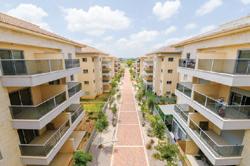






OU ISRAEL CENTER 23 55ינבלשדחיתליהקןוזח ןתנוי תזוחא A spacious apartment in a central location in your name in Tabu (no deposit) An active community of good people, like you Shopping, culture and health centers within walking distance A synagogue and a commercial center in the complex www.AhuzatYonatan.co.il/en Tel:Google:072-3950738AhuzatYonatan A community for 55 in Yad Binyamin room for joy
The book of Numbers comes to a close that is very strange indeed. Earlier in the parsha of Pinchas we read of how the five daughters of Tzelophehad came to Moses with a claim based on justice and human rights.1 Their father had died without sons. Inheritance – in this case, of a share in the land – passes through the male line, but here there was no male line. Surely their father was entitled to his share, and they were his only heirs. By rights that share should come to them:
“Why should our father's name be lost to his family merely because he had no son? Give us a portion of land along with our father's brothers.” (Num. 27:4)
Moses had received no instruction about such an eventuality, so he asked God directly. God found in favour of the
1. The word “rights” is, of course, an anachronism here. The concept was not born until the seventeenth century. Nonetheless it is not absurd to suggest that this is what is implied in the daughters’ claim, “Why should our father's name be disadvantaged?”
women. “What Tzelophehad’s daughters say is right. You must certainly give them a heritable portion of land along with their father's kin. Transfer their father’s portion to them.” (Num. 27:7) He gave Moses further instructions about the disposition of inheritance, and the narrative then passes on to other matters.
Only now, right at the end of the book, does the Torah report on an event that arose directly from that case. Leaders of Tzelophehad’s tribe, Menasseh, son of Joseph, came and made the following complaint. If the land were to pass to Tzelophehad’s daughters and they married men from another tribe, the land would eventually pass to their husbands, and thus to their husband’s tribes. Thus land that had initially been granted to the tribe of Menasseh might be lost to it in perpetuity.
Again, Moses took the case to God, who offered a simple solution. The daughters of Tzelophehad were entitled to the land, but so too was the tribe. Therefore, if they wish
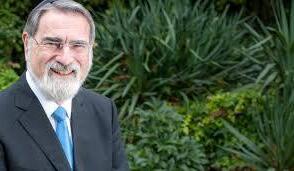
24 TORAH TIDBITS 1524 / MATOT-MASEI
May the learning of these Divrei Torah be תמשנ יוליעל HaRav Ya'akov Zvi ben David Arieh zt"l
COVENANT & CONVERSATION
RABBI LORD JONATHAN SACKS ZT"L Former Chief Rabbi of the United Hebrew Congregations of the Commonwealth תומשנ יוליעל ה״ע רטרש קחצי תב הינעמו בייל הירא ןב לאירזעו ה״ע זייא דוד לארשי תב הדלוגו רשא בקעי ןב סחנפ
THOUGHTS ON THE WEEKLY PARSHA
The Complexity of Human Rights
to take possession of the land, they must marry men from within their own tribe. That way both claims could be honoured. The daughters did not lose their right to the land but they did lose some freedom in choosing a marriage partner.
The two passages are intimately related. They use the same terminology. Both Tzelophehad’s daughters and the leaders of the clan “draw near”. They use the same verb to describe their potential loss: yigara , “disadvantaged, diminished”. God replies in both cases with the same locution, “kein … dovrot/dovrim,” rightly do they speak.2 Why then are the two episodes separated in the text? Why does the book of Numbers end on this seemingly anticlimactic note? And does it have any relevance today?
Numbers is a book about individuals. It begins with a census, whose purpose is less to tell us the actual number of Israelites than to “lift” their “heads”, the unusual locution the Torah uses to convey the idea that when God orders a census it is to tell the people that they each count. The book also focuses on the psychology of individuals. We read of Moses’ despair, of Aaron and Miriam’s criticism of him, of the spies who lacked the courage to come back with a positive report, and of the malcontents, led by Korach, who challenged Moses’ leadership. We read of Joshua and Caleb, Eldad and Medad, Datham and Aviram, Zimri and Pinchas, Balak and Bilam and others. This emphasis on individuals reaches a
2. These two passages may well be the source of the story of the rabbi who hears both sides of a marital dispute, and says to both husband and wife, “You are right.” The rabbi’s disciple asks, “How can they both be right?” to which the rabbi replies, “You too are right.”
Jerusalem Real Estate is My Business
Eta: 054-723-3863
Amazing stand alone homes in
OLD KATAMON 80 sqm with 2 bedrooms and 2 baths, one flight up with elevator. Completely renovated with terrace that opens into a sukka. Full of light & surrounded by greenery. Very quiet. 4,200,000 NIS
Shmuel border of OLD KATAMON. 139.7 sqm & registered terrace 123 sqm. 1st floor 3 beds & two baths. Central air, underfloor heating, parking area. Very light. 6,000,000 NIS
OLD KATAMON, Moshava
Bldg. 74 sqm, two beds, 2 baths & 2 terraces. 3rd floor great views. Available immediately. 2 elevators, underground parking. 24/7 doorman. 3,650,000 NIS
In BAKA, most sought out location. New apartment duplex of 236 sqm plus 81 sqm of outdoor space. Plus parking. For more info call Eta: 0547233863
ARNONA. Fantastic garden apartment for sale on Lupo Street. 175 sqm 6 rooms 4 bedrooms and 3.5 baths. Extra office downstairs. 60 sqm garden. Storage room. Parking. 8,500,000 NIS
MEKOR HAIM 100 sqm with 3 bedrooms and 2 full bathrooms, registered parking and sukka terrace.





Shabbat elevator
Price 3,850,000 NIS
Eta Morris Realty, Ltd.

etamorrisrealestate@gmail.com
Eta: 054-723-3863
etamorrisrealty.co.il

OU ISRAEL CENTER 25
OLD KATAMON, TALBIYA, BAKA, GERMAN COLONY
Rehov Aluf Simhoni Kiriat
climax in Moses’ prayer to “God of the spirits of all flesh” (Bamidbar 24:16) to appoint a successor – understood by the Sages and Rashi to mean, appoint a leader who will deal with each individual as an individual, who will relate to people in their uniqueness and singularity.
That is the context of the claim of Tzelophehad’s daughters. They were claiming their rights as individuals. Justly so. As many of the commentators pointed out, the behaviour of the women throughout the wilderness years was exemplary while that of the men was the opposite. The men, not the women, gave gold for the golden calf. The spies were men: a famous comment by the Kli Yakar (R. Shlomo Ephraim Luntschitz, 1550 –1619) suggests that had Moses sent women instead, they would have come back with a positive report.3
077-2050015
052-2678749
golanechasim@gmail.com
bright, airy, sukkah balcony facing a magnificent panoramic view, 3 exp Shabbat elevator, parking, 3,290,000 NIS
Recognising the justice of their cause, God affirmed their rights as individuals.
Meir Golan

But society is not built on individuals alone. As the book of Judges points out, individualism is another name for chaos: “In those days there was no king in Israel, everyone did what was right in their own eyes.” Hence the insistence, throughout Numbers, on the central role of the tribes as the organising principle of Jewish life. The Israelites were numbered tribe by tribe. The Torah sets out their precise encampment around the Mishkan and the order in which they were to journey. In Naso, at inordinate length, the Torah repeats the gifts of each tribe at the inauguration of the Mishkan, despite the fact that they each gave exactly the same. The tribes were not accidental to the structure of Israel as a society. Like the United States of America, whose basic political structure is that of a federation of (originally thirteen, now fifty) states, so Israel was (until the appointment of a king) a federation of tribes.
RASCO: new 4 room apartment, 95m, master suite, elevator, balcony, very nice view 2,950,000 NIS
BAKA: 4 room apartment, 85m, elevator, neat & nice apartment. 2,850,000 NIS
Old Katamon: Spacious 3-room apartment in a very quiet street, 75 sqm, sukkah balcony facing a green and pastoral view, 3 exp. Shabbat elevator, private parking storeroom, 2,690,000 NIS
ARNONA: 4-room apartment, 90m, beautifully renovated, master suite, balcony, storage, Shabbat elevator, private parking 3,250,000 NIS
ARNONA: 4-room apartment, 90m, master suite, balcony, storage, Shabbat elevator, private parking. 3,250,000 NIS
BAKA: New 4 room apartment in a new building, 88m, master suite, storage, Shabbat elevator, private parking. 3,900,000 NIS
BAKA: New 4 room apartment in a new building, 88m, master suite, storage, Shabbat elevator, private parking, 3,950,000 NIS
RECHAVIA: 4-room apartment, 92m, Suka balcony, Shabbat elevator, fully accessible, private parking, storage 4,400,000 NIS
ARNONA: 5-room apartment, 108m, balcony, nice view, Shabbat elevator, fully accessible, private parking, storage. 4,000,000 NIS
ARNONA: 5-room apartment, 120m, balcony, elevator, fully accessible, private parking, storage 4,350,000 NIS
RASKO: New 4-room penthouse apartment, 115m, beautiful terraces for a lovely panoramic view, elevator. 4,250,000 NIS
BAKA: 5-room garden apartment, 140m, master suite private parking, storage, full of light, nice garden, 6,000,000 NIS
TALBIYA: 4-room apartment, 95m, sukkah balcony, 2nd floor. 5,200,000 NIS

The existence of something like tribes is fundamental to a free society.4 The modern state of Israel is built on a vast panoply of ethnicities – Ashkenazi, Sefardi, Jews from Eastern, Central and Western Europe, Spain and Portugal, Arab lands, Russia and Ethiopia, America, South Africa, Australia, and other places, some Hassidic, some “Yeshivish”, others “Modern”, others “Traditional”, yet others secular and cultural.
OLD KATAMON: 5-room apartment, 127m, master suite, balcony, private parking, storage, full of light. 5,500,000 NIS
OLD KATAMON: Spacious new 5-room apartment, 140m, terrace, underfloor heating, Shabbat elevator, 2 parking, 6,300,000 NIS
We each have a series of identities, based partly on family background, partly on
FOR RENT:BAKA: nice 4-room apartment, 82m, beautifully renovated, master suite, air conditioners, balcony, second floor, elevator - fully accessible, storage, 8,000 NIS
OLD KATAMON: Spacious new 5-room apartment in a new project, 140m, terrace, underfloor heating, Shabat elevator, 2 parking. 6,300,000 NIS
4. See most recently Sebastian Junger: Tribe: On Homecoming and Belonging, Fourth Estate, 2016.
26 TORAH TIDBITS 1524 / MATOT-MASEI
3. Kli Yakar on Numbers 13:2.
Katamon:
apartment in a small and quiet street,
sqm, renovated, very bright and airy, master bedroom, Safe room
sukkah balcony, view, elevator,
NIS
Katamon:
apartment, 90 sqm, well split,
Meir Golan Old
4-room
101
(mamad),
3,400,000
Old
4-room
occupation, partly on locality and community. These “mediating structures”, larger than the individual but smaller than the state, are where we develop our complex, vivid, face-to-face interactions and identities. They are the domain of family, friends, neighbours and colleagues, and they make up what is collectively known as civil society. A strong civil society is essential to freedom.5
That is why, alongside individual rights, a society must make space for group identities. The classic instance of the opposite came in the wake of the French revolution. In the course of the debate in the French Revolutionary Assembly in 1789, the Count of Clermont-Tonnerre made his famous

5. This is the argument made most powerfully by Edmond Burke and Alexis de Tocqueville.
declaration, “To the Jews as individuals, everything. To the Jews as a nation, nothing.” If they insisted on defining themselves as a nation, that is, as a distinct subgroup within the republic, said the Count, “we shall be compelled to expel them.”
Initially, this sounded reasonable. Jews were being offered civil rights in the new secular nation state. However, it was anything but. It meant that Jews would have to give up their identity as Jews in the public domain. Nothing – not religious or ethnic identity – should stand between the individual and the state. It was no accident that a century later, France became one of the epicentres of European antisemitism, beginning with Édouard Drumont’s vicious La France Juive , 1886, and culminating in the Dreyfus trial. Hearing the Parisian crowd shout “Mort aux Juifs”, Theodor
Beating the banks every time
OU ISRAEL CENTER 27
Herzl realised that Jews had still not been accepted as citizens of Europe, despite all the protestations to the contrary. Jews found themselves regarded as a tribe in a Europe that claimed to have abolished tribes. European emancipation recognised individual rights but not collective ones.
The primatologist Frans de Waal, whose work among the chimpanzees we mentioned in this year’s Covenant & Conversation on Korach, makes the point powerfully. Almost the whole of modern Western culture, he says, was built on the idea of autonomous, choosing individuals. But that is not who we are. We are people with strong attachments to family, friends, neighbours, allies, co-religionists and people of the same ethnicity. He continues:
A morality exclusively concerned with individual rights tends to ignore the ties, needs and interdependencies that have marked our existence from the very beginning. It is a cold morality that puts space between people, assigning each person to his or her own little corner of the universe. How this caricature of a society arose in the minds of eminent thinkers is a mystery.6
That is precisely the point the Torah is making when it divides the story of the daughters of Tzelophehad into two. The first part, in parshat Pinchas, is about indi vidual rights, the rights of Tzelophehad’s daughters to a share in the land. The sec ond, at the end of the book, is about group rights, in this case the right of the tribe


of Menasseh to its territory. The Torah affirms both, because both are necessary to a free society.
Many of the most seemingly intractable issues in contemporary Jewish life have appeared because Jews, especially in the West, are used to a culture in which individual rights are held to override all others. We should be free to live as we choose, worship as we choose, and identify as we choose. But a culture based solely on individual rights will undermine families, communities, traditions, loyalties, and shared codes of reverence and restraint.
Despite its enormous emphasis on the value of the individual, Judaism also insists on the value of those institutions that preserve and protect our identities as members of groups that make them up. We have rights as individuals but identities only as members of tribes. Honouring both is delicate, difficult, and necessary. The book of Numbers ends by showing us how. 053 427 6363
These weekly teachings from Rabbi Sacks zt”l are part of his ‘Covenant & Conversation’ series on the weekly Torah teaching. With thanks to the Schimmel Family for their generous sponsorship, dedicated in loving memory of Harry (Chaim) Schimmel. Visit www.RabbiSacks.org for more.

28 TORAH TIDBITS 1524 / MATOT-MASEI
6. Frans de Waal, Good Natured, Harvard University Press, 1996, p.167.
CINEMA
CITY
MALL,
JERUSALEM ArthurMSamuels@gmail.com PODIATRIST Over
30
years
experience Arthur
Licensed in Israel & America
Samuels,
DPM
CINEMA CITY MALL, JERUSALEM
This week’s Parsha, Matot-Masei, opens with a listing of the people’s journeys through the wilderness and goes on to describe the territory of the land of Israel. We invite you to implement this week’s parsha in your own life and make a ‘journey’ to the beautiful city of Jerusalem.
The largest collection of exclusive Jerusalem properties is just one search away www.remaxjerusalem.com


67 sqm, 3 room apartment. Spacious and well lit. 9 sqm balcony. Parking and elevator included NIS 3,390,000
Ezra Levy 054-842-1289
Mordechai Hayehudi St., Baka
Magnificent Baka Garden home. Fully renovated, 90 sqm, 3 rooms plus bright basement room. Private entrance. furniture & appliances incl. NIS 5,500,000
Alyssa Friedland 054-668-4111
Shecter Project, Ramot New Development. 115 sqm, 5 room apartment. 2 attached storage units. 140 sqm garden. adjacent private space with building possibilities. NIS 5,950,000 Ruthy Elinson 058-697-2166
Sderot HaNasi HaShisi., Kiryat Ha’leom
Beautiful 78 sqm apartment. High ceilings. Master + 3 small bedrooms (half rooms), 9 sqm balcony, 2 parking spots, storage. NIS 3,700,000 David Weiser 055-276-2960
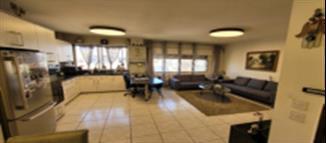
Shakhal St., Givat Mordechai
In Lev Ha’ir. Architecturally designed 4room apartment Spacious 100 sqm plus 15 sqm balcony facing neighborhood square NIS 3,595,000 Emuna Dadon 054-806-7106
Ma’avar










4 Bedroom Garden apartment. Ground floor, handicap accessible with spacious kitchen plus 5 sqm balcony. NIS 5,500,000 Benjy Danan 058-651-9626
Brener St., Talbieh
Beautiful 129 sqm apartment full of light. 3 rooms, 2 full bathrooms. Sukkah balcony in a full-service building (gym, pool, etc)



NIS 8,950,000
Orna Even - 054-621-6069

Ha-Dishon St., Malha
4 and half room apartment, 2 bathrooms,109s qm. Sukkah balcony, central A/C, elevator, parking. NIS 3,900,000 Gadi Lissak 050-212-7748

118


Spacious 3 bedroom apartment, 81 sqm, elevator, parking, storage, 6th floor elevator, easy accessibility


NIS 3,100,000
Judy Blumenfrucht 054-431-8814
Kaf Tet be-November St , Old Katamon
Hamitle St., Ramat Eshkol
Beit Lehem Rd, Baka
PROBING THE PROPHETS
BY RABBI NACHMAN (NEIL) WINKLER Faculty, OU Israel Center

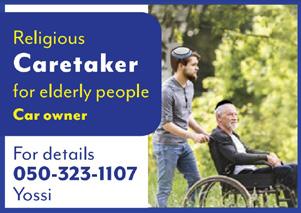

number is 157,600. The total count of the army age men is 603,550 without the tribe of Levi.
Rabbi Winkler's popular Jewish History lectures can be viewed by visiting the OU Israel Video archive: https://www.ouisrael.org/video-library
This second of the pre-Tish’a B’Av haftarot continues directly from the closing pasuk of last week’s haftarah. We clearly understand our rabbinic scholars’ decision to use the first verse of the second chapter as an “addendum” to the first perek of Sefer Yirmiyahu in order to connect Hashem’s promise to destroy those enemies who harm Israel, thereby adding a (somewhat) comforting close to a chapter that warned of the punishment that could befall the sinful nation. What is somewhat puzzling, however, is why these comforting p’sukim should be used to open the second perek – one filled with harsh criticism and condemnation of Israel. In order to understand this we must review the theme of the second chapter itself and learn what Yirmiyahu wanted this pasuk to convey to his generation-and to ours.
Since this haftarah is one of censure and blame, certainly a fitting theme for these three weeks, the navi begins by decrying the faithlessness of the nation and their purposeful estrangement from Hashem.
descendants lineage, next
He opens his message by quoting G-d’s question to the nation: “What wrong did your ancestors find in Me that they distanced themselves from My presence?”
Yirmiyahu continues with Hashem’s argument challenging the people to explain why the past generations forgot how G-d had led them through a barren desert, “b’eretz tziya v’tzalmavet”, “a land of waste and darkness”, to bring them to their fruitful and fertile land.
The people travel and camp with the Mishkan in their midst. Physically and metaphorically. We travel our history with G-d in our midst. While the distinct feeling you get in the detailed description of where each tribe encamped is the feeling of an army encampment, there is another layer of meaning. Yes, regimented. Specific. Detailed. Organized. But an army for which purpose? To fight the anticipated foes in the Land of Israel? Or to be the army of Hashem? A fighting army with its G-d in its midst? Or both?
4th aliya (3:1-13) Aharon’s sons’ names were Nadav, Avihu, Elazar and Itamar. Nadav and Avihu died without children. Elazar and Itamar serve as Kohanim with Aharon. Take the Leviim: they are to serve Aharon. The Leviim are responsible for the Mishkan: to support the Kohanim and the people, to facilitate the running of the Mishkan. The Leviim shall take the place of the first-born, who became obligated to me when saved in Egypt.
There are 2 groups mentioned here: Kohanim and Leviim. The lineage of the Kohanim is given. It just doesn’t take much room. Because Aharon is a Kohen and his sons. But he only has 2. So the entire lineage of the Kohanim is 3 people. The Leviim, on the other hand, are an entire tribe,
It is precisely this question, this challenge, meant to echo in the hearts of the wayward generation, that explains why it opens this perek (yet was used to end the last haftarah). “Lechtech acharai bamidbar” – Yirmiyahu begins his condemnation of Israel by reminding them of “the good old days”, i.e. the early years when they had the faith to blindly follow Hashem through that “land of waste and darkness.” It is actually a painful cry of the prophet asking: “ISRAEL, WHAT HAPPENED TO YOU?” Indeed, it is the very verses that offered the people a comforting message to close the first perek that, in truth, were written as an introduction to explain why Israel would soon suffer the painful punishments described in the subsequent p’sukim.
households the and from camp was curtains 8,600, responsible Table, camping structure ports Levi the ilies had 3 of the The on Gershon, responsibility fell furniture. care the And replace
30 TORAH TIDBITS 1524 / MATOT-MASEI
14 TORAH TIDBITS 1516 / BAMIDBAR
Every person who was not born in Israel and lives in the Holy Land should celebrate his/her ALIYANNIVERSARY annually!
REMEMBER! WITH ALIYAH BLESSINGS! The NEAMANS
Religious Caregiver
Car owner
Yirmiyahu proceeds to condemn the people for choosing foreign “deities” as a “replacement” for their One G-d, he criticizes the fact that they call out to Hashem only after their worship of pagan gods brought them no relief from their difficulties and he then reiterates to them that all of the threatened doom and destruction – all of his warnings – are a result of their abandonment of G-d and their “amnesia” of Hashem’s past kindnesses. He reminds them to recall all of this…but they forgot to remember!
And, for me, that is a crucial idea – and perhaps the very reason why it appears at the beginning of Sefer Yirmiyahu. Forgetting the past, ignoring events of yesterday and turning our backs on history are the paving stones of the highway to abandonment – of our people, of our beliefs and of
our G-d. It is for good reason that Moshe Rabbeinu tells Israel before he departs: “Z’chor y’mot olam” – to remember the days of yore and why we have six mitzvot commanding us “Zachor!!” – “Remember!”
It is quite significant, therefore, that the prophet begins his chapter of censure with Hashem’s words “Zacharti lach” – I, Hashem, remember the positive and kind acts you once did for me, so does Yirmiyahu plead with Israel to remember the positive and kind acts that Hashem has done for them.

Truly, if you recall the kindnesses, if you understand your incredible history and if you keep in mind the miraculous story of your survival – you could never abandon the source of your very existence…but only as long as you don’t forget to remember!

Mourning for Jerusalem in 2023

OU ISRAEL CENTER 31
THURSDAY, JULY 27 • 8:00 A.M. YU Israel Campus, 40 Duvdevani, Jerusalem Shacharit and Kinnot Explanations Open to men & women | Please bring your own kinnot Live webcast available at
YESHIVA UNIVERSITY PRESENTS
www.yutorah.org/tishabav
TISHA B’AV 5783 WITH RABBI DOVID GOTTLIEB Rabbi, Kehilat Ha’Ela, Ramat Beit Shemesh, Rebbe, Yeshivat Har Etzion, & Director, Tzalash
Sponsored by Noa & Jay Zwiebel and Rebecca & Saul Lubetski in memory of David Zwiebel z”l

32 TORAH TIDBITS 1524 / MATOT-MASEI
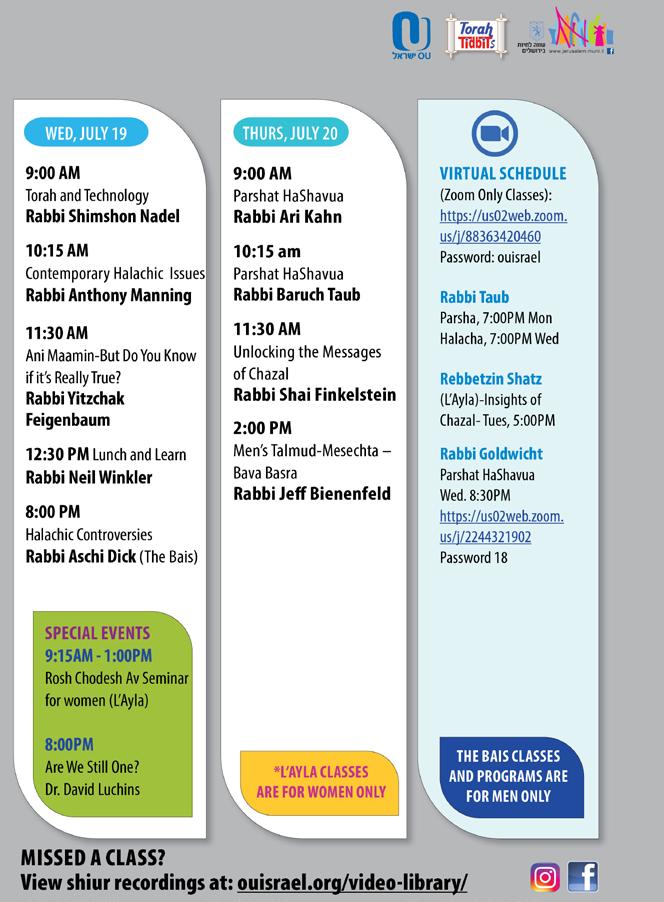
OU ISRAEL CENTER 33
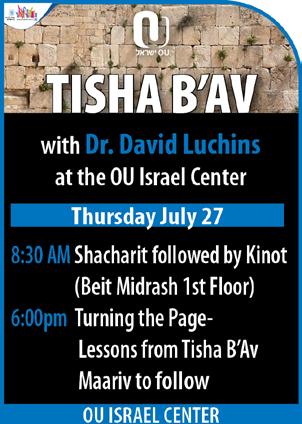


34 TORAH TIDBITS 1524 / MATOT-MASEI

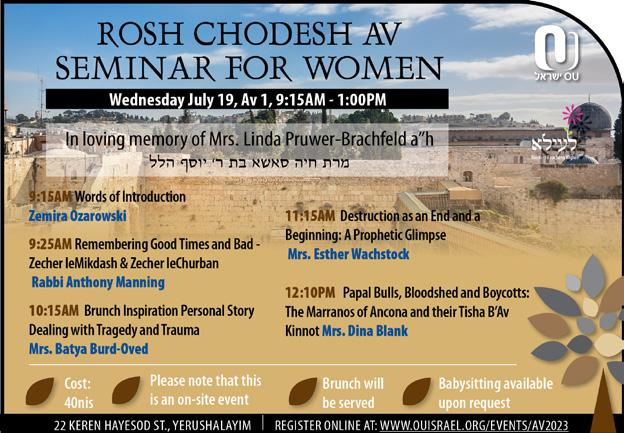
OU ISRAEL CENTER 35
matters. that voice, afterlife. I can-
For no foland comreal amazing teachreceived us
For Sale: Ben Maimon, 4 rooms, 113m, 2 bathrooms, porch, 1st floor, elevator, 6.2 million NIS
GET FIT WHILE YOU SIT: Exercise for ladies Sundays 12:45-1:30pm at the OU Israel Center Sura Faecher 0504153239
SHIUR SPONSORS
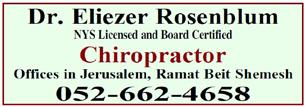
Thursday July 6th - Rabbi Ari Kahn's Shiur was sponsored by Chaya (Harriet) Nussbaum in loving memory of her father, Aryeh Leib ben Yisur z"l, yahrzeit was 17 Tammuz
Smadar 050-3114040 // 02-642-4329
smadi_bida@walla.co.il
PRI HADASH
CENTER
Monday mornings 10.30-12.30
For more details, call Ruth 02-628-7359 or Judy 054-569-0410
OU ISRAEL CENTER 91
Tuesday July 10th - Rabbi Baruch Taub's Zoom Shiur was sponsored by Chaya (Harriet) Nussbaum in loving memory of her father, Aryeh Leib ben Yisur z"l, yahrzeit was 17 Tammuz
All learning on Sundays July 9 & July 16 have been sponsored by the Friedman Family
ל"ז היעשי ןב םהרבא ףסוי תמשנ יוליעל
הרש ןב באוי המלש האופרל
Rabbi Goldscheider’s Shiur has been sponsored for the 2023 Academic Year
ל’’ז המלש ןב בוט םשו ה’’ע םהרבא תב םירמ תמשנ וליעל
Rebbetzin Shira Smiles Shiur is sponsored for the 2023 academic year by Dr. & Mrs. Menachem Marcus in memory of their parents, Rose & Dr. Emanuel Marcus z”l -
ל”ז סוקרמ השמ ןב יכדרמו ריאמ ףסוי תב לזייר Rosi and Ernest Strauss z”l -
ל”ז סוארטש דוד ןב לאינדו םהרבא תב דומיל
Rabbi Breitowitz’s Tuesday Shiur - Minchat Chinuch is sponsored for the academic year 2023 by Rabbi Refoel & Sharon Auman in memory of their parents Edith & Reiner Auman z”l
ד”יה לאפר תב ה”ע רתסאו ל”ז קודצ ןב הנוי and their son Rabbi Shmuel Eliyahu Auman z”l
י”נ לאפר ברה ןב ל”ז והילא לאומש ברה
Rabbi Goldin’s Shiur is sponsored for the 2023 academic year by Dr. & Mrs. Menachem Marcus in memory of beloved aunts Irma Haas a”h and Hilde Myer a”h
Rabbi Manning’s Shiur has been sponsored for the 2023 academic year
ל’’ז ןמלק ןב גילזו ה’’ע תידנרב תב הנרב תמשנ יוליעל
Rabbi Taub’s weekly Thursday Parshat HaShavua Shiur is sponsored by The Jewish Legacy Foundation
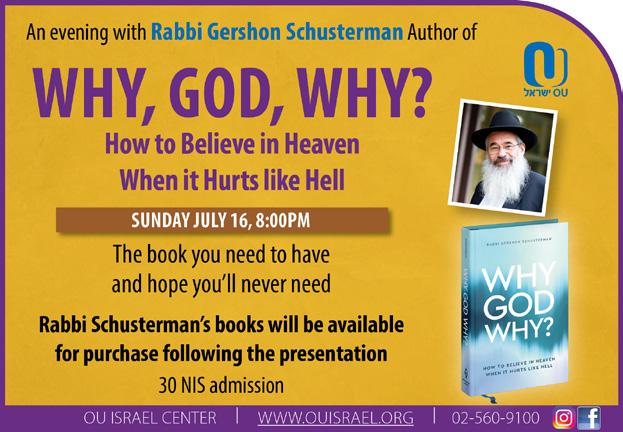
36 TORAH TIDBITS 1524 / MATOT-MASEI
WOMEN'S WRITING WORKSHOP AT THE OU ISRAEL
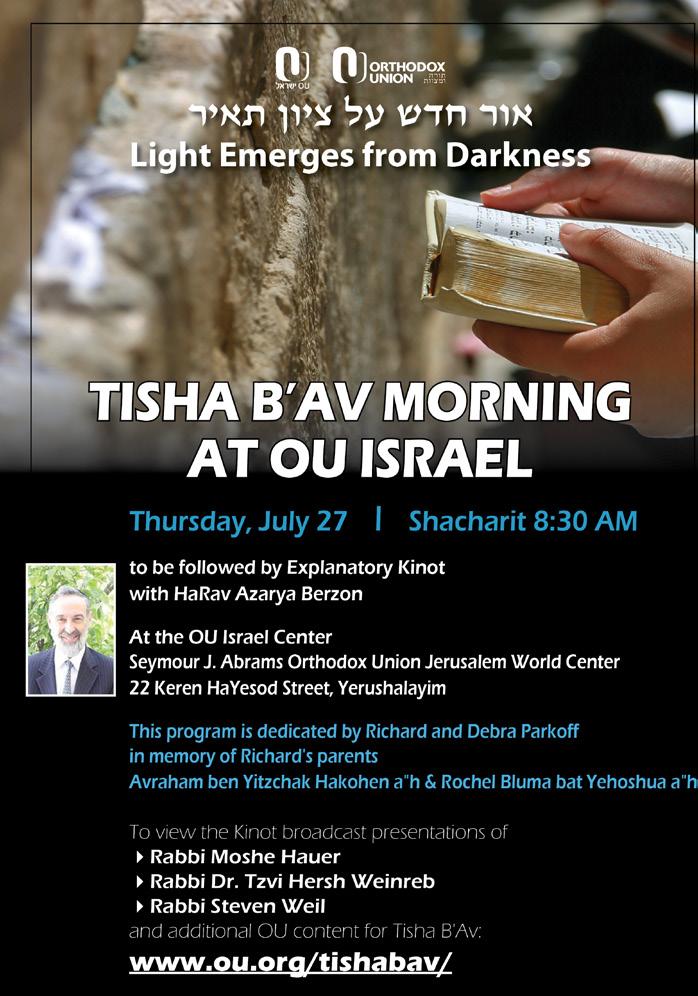
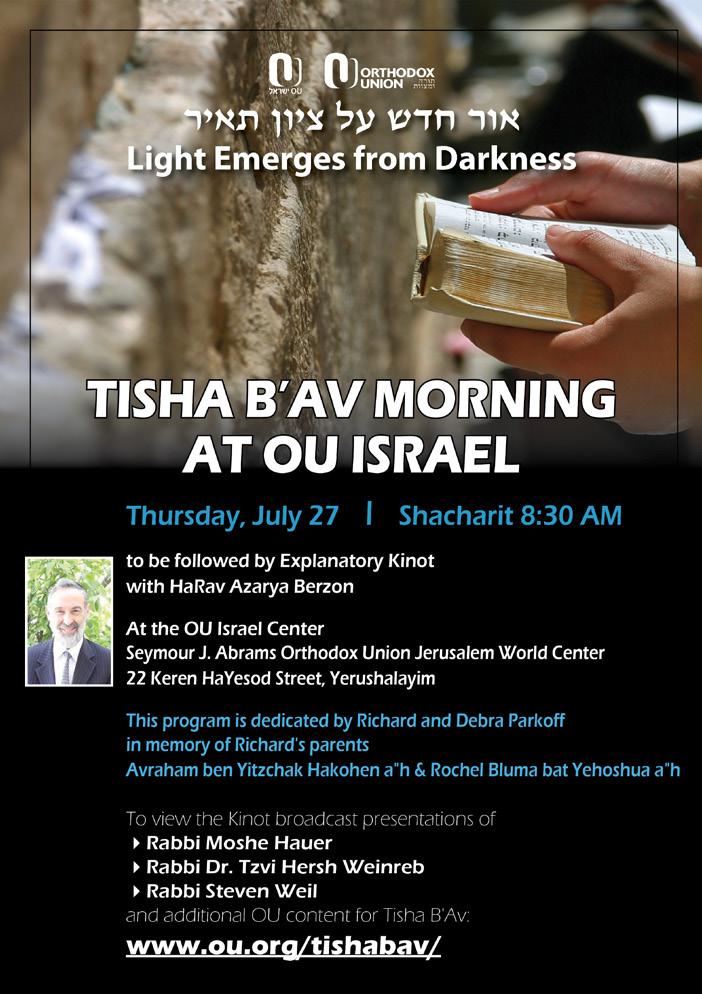
RABBI SHALOM ROSNER
Rav Kehilla, Nofei HaShemesh Maggid Shiur, Daf Yomi, OU.org Senior

Not Just What - But How You Say It
In the beginning of Parshat Matot the Torah informs us of the laws of nedarim (vows). One can create a binding obligation by merely making a simple declaration. Today one’s verbal recommendation can help establish another’s reputation or, unfortunately, can defame another and cause tremendous harm. Especially given modern social media and networks, words spread like wildfire and one must be careful with what they state verbally or in writing.
What distinguishes man from animals is the power of speech. Man is referred to as a “midaber”. What is critical when communicating with others is not just the words we utter, but the way in which we deliver our message.
At the very end of Parshat Masei, we are taught a lesson in how best to communicate a challenging message. Bnot Tzlofhad had earlier complained to Moshe that they should be entitled to inherit their father’s property since he had no sons. Now that such an inheritance was permitted, members of their tribe were concerned that the land these women inherited would be transferred to their husbands and their tribe
will lose a portion of the territory they were allotted in Eretz Yisrael. Moshe addressed the issue as follows:
This is the word that Hashem has commanded regarding Tzlofhad's daughters. Let them marry whomever they please, but they shall marry only to the family of their father's tribe. (Bamidbar 36:6).
Moshe informs Bnot Tzlofhad that they are free to marry whomever they choose (which is likely quite reassuring to them). Then he adds --- provided however, that such individuals are from their tribe! This was a brilliant manner in which to deliver his message that would limit Bnot Tzlofhad from marrying anyone from any of the other eleven tribes. They are not forced into a pre-arranged marriage. They are free to choose their husband ----so long as he is from their shevet.
The Aish Tamid derives a powerful educational lesson from this tactic. When one is to deliver a message that may be difficult to accept, it is best to begin with the positive and only afterwards to mention the limitation. Typically, when people hear a restriction or limitation imposed on them, they focus on the negative and it is hard for them to listen to what follows. Therefore, it is optimal to open with an encouraging message so the immediate reaction is positive and then to mention the limitation so it softens the blow.
May we use our gift of speech properly, avoid bad mouthing others, and may we successfully deliver our messages to others so we can maximize the desired effect.
38 TORAH TIDBITS 1524 / MATOT-MASEI
Ra"M, Kerem B'Yavneh
We're growing We're growing
Non-profit organization in Jerusalem is looking to hire an energetic team member for meaningful and challenging work in the
Community Relations Department
Start immediately. CV and letters of recommendation: admin@lifeline.org.il
The position:
•English communication and content writing.
•Maintaining CRM.
•Guiding groups and visitors through our workshops.

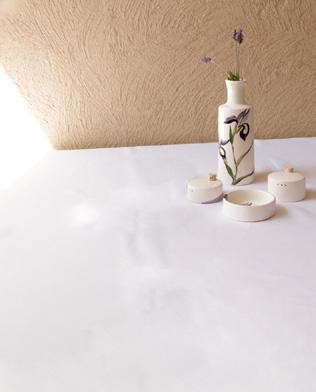
Requirements:
1. Academic education.
2. Native English speaker must (advantage of fluent Hebrew).

3. Relevant experience.
4. Knowledge of computer applications.
5. Organized, responsible, committed and loyal, good interpersonal skills and ability to work in a team.
OU ISRAEL CENTER 39
Faculty, OU Israel Center
Science of Speech
Our parashah begins with the laws of vows, obligations, and the power one’s words have to create new realities. What are some relevant lessons here for us to learn and apply to our day-to-day living?
It is well known that the quality of speech is what makes people unique. In characterizing the various dimensions in this world, Chazal list inanimate objects, vegetative growth, animal species, and finally the world of the ‘ medaber , ’ the one who speaks. The “ ruach memala,” the power of speech, the spirit of G-d blown into man, brings his G-dliness to the fore. “Ish ki yidor neder laHashem oh hishava shevua le’esor isssar al nafsho lo yachel devaro – if a man makes a vow to G-d or makes an oath to obligate himself he must not break his word.” (Bamidbar 30;3) Rashi comments on the words, “lo yachel devaro,” when one makes a vow, “lo yechalel devaro,” one should be careful not to make his words profane. “Chilul” is taking something holy and treating it in a way that disrespects its sacred purpose. Vayomer Yehudah explains that we must uphold whatever words come out of our mouths, even words that are not said as a promise. We must understand that even
casual words have power that should be used carefully and appropriately.
The Netivot Shalom quotes Rabbeinu Yonah who teaches that when one who sanctifies his mouth, it becomes a “ klei sharet,” a holy vessel. Indeed, the purpose of our creation is to praise Hashem, and as such, the mouth becomes the medium of this holy mandate. It is therefore not surprising that the essential mitzvot of a Jew involve speech: learning Torah, prayer, remembering Shabbat. Words spoken from a mouth that has been refined have the status of kedushah and are inherently more elevated.
In Lekutei Torah the Ariz”l explains that a malach, an angel, is created with every word that emanates from one’s mouth. It can either be a positive force or a negative one. “Lo yachel devaro” tells a person that no speech is profane, a spiritual force is created from everything he says. Just as it is prohibited to use a “kli sharet” for mundane purposes, likewise, all speech should be measured carefully. Shabbat is a time, as Yeshaya Hanavi teaches us, that our speech must be even more elevated than during the week. Our Torah learning takes on a different dimension on Shabbat, and some are careful to be more mindful how they use any words on Shabbat.
The Talmud teaches that even one’s casual conversations will be presented at his final judgment. After his passing, Rabbi
40 TORAH TIDBITS 1524 / MATOT-MASEI REBBETZIN SHIRA
SMILES
Florine Do-La-La
Do you want to feel secure & relaxed about your birth?
Shabbos Bistro

Premium delicious shabbes meals



Openning hours:

Thursday 12 pm-2 am
Friday 8 am-3 pm
02-9964469 | 054-8777347
Iben Shafrut 5, Rehavia, Jerusalem
Yitzchak Blazer came to his student Rabbi Chaim Berlin in a dream and related that the harshest judgement is in the area of speech. Rav Biderman explains the following pasuk quoted in the Gemara, “u’magid l’adam mah secho – and declares to man what his speech is” (Amos 4:13). After one’s lifetime he will be shown how much his tefillah could have impacted the dynamics of the world globally and individually had he used this power to the fullest. Let us take this meaningful lesson to invest in our words, holy and casual, to elevate ourselves and those around us.

In the heart of calm and pastoral BAKAPrivate arab house, 6 rooms, 500m + possibility of building 250m, huge garden, approx. 700m, completely renovated, underfloor heating + a/c, large parking, 5 bathrooms, 5 toilets, green
MENDEL 0528980111
MENDEL 0528980111
BAKA - New penthouse, 4 rooms in a small luxurious building with character, alone upstairs, 3rd floor + elevator, 4 orientations, 3 toilets, 2 bathrooms, terrace / sukkah, 70m, parking, store-room
BAKA - New penthouse, 4 rooms in a small luxurious building with character, alone upstairs, 3rd floor + elevator, 4 orientations, 3 toilets, 2 bathrooms, terrace / sukkah, 70m, parking, store-room
5390000 NIS MENDEL 052-8980111
5450000 NIS MENDEL 052-8980111
BAKA / MEKOR HAIM – 4 rooms, 90m, 2nd floor + elevator, renovated by architect, fireplace, a/c, very central, close to all amenities
MOSHAVA / In a building after TAMA 38, new apartment, 4 rooms, 3rd floor + elevator, balcony/partial sukah, opened sight, 2 bathrooms, calm, parking

MENDEL 052-8980111
MENDEL 052-8980111
TALBIEH – 95m, elevator, very well kept, bright, in the corner of building, 3 orientations, accessible
BAKA / MEKOR HAIM - 4 rooms, 90m, 2nd floor + elevator, completely renovated, fireplace, a/c, gas heating, very central, close to all amenities
3100000 NIS MENDEL 052-3202488
MENDEL 052-8980111
ADAM st. close to Arnona Hatzeira, in a step building, very spacious 5 rooms + terrace, 40m, open view, renovated, private entrance, quiet, potential of adding extra unit, 3450000 nis
Near Arnona Hatzaira, in a step building, very large 5-room apartment + balcony/sukkah, 40m, renovated, 3rd floor, private entrance, quiet, potential for extra independent unit
MICHAEL 052-3202488
MICHAEL 052-3202488
ARNONA – 3 rooms, that will be transformed to 90m, 3rd floor with elevator, store-room, parking
ARNONA – 3 rooms, that will be transformed to 90m, 3rd floor with elevator, store-room, parking
ONLY 2550000 NIS
ONLY 2550000 NIS
MICHAEL 052-3202488
MICHAEL 052-3202488
In the pastoral BAKA - quiet and central, stunning villa 350m, in a magical atmosphere, designed, pool, 4 bedrooms, cinema room and more, 4 bathrooms, garden, parking
BAKA a stunning 3 story house on a quiet and pastoral cul-de-sac, very high end designed, swimming-pool, large wrap around garden, parking
MIKAEL 052-3202488
MICHAEL 052- 3202488
ARNONA HATZEIRA - Very spacious penthouse, 120m, 4th floor + elevator, huge terrace / succah, 75m, open view, 2 parking spaces, cellar, 3 toilets, quiet, completely renovated, immediate entrance
ARNONA HATZEIRA - Very spacious penthouse, 120m, 4th floor + elevator, huge terrace / succah, 75m, open view, 2 parking spaces, cellar, 3 toilets, quiet, completely renovated, immediate entrance
MICHAEL 052- 3202488
MICHAEL 052- 3202488
OU ISRAEL CENTER 41
RABBI JUDAH MISCHEL
Mashpiah, OU-NCSY Executive Director, Camp HASC Author of Baderech: Along the Path of Teshuva (Mosaica 2021)

Kindnesses, Baderech
In the second half of the 20th Century, Rav Eliyahu Roth, zt’l, was one of the great talmidei chachamim and holy men living in Yerushalayim. A confidant and right hand to the tzadik Rebbe Shloimkeh Zhviller, zy’a, he was widely respected as a brilliant and insightful educator, as well as a trusted baal eitzah and wiseman in his own right. “Rav Elya” was an eved Hashem through and through, who suffered poverty and personal loss, but always maintained his faith and joyous disposition.
During the war-torn pre-State days in the Holy City, the Jewish population sustained incessant bombing from the Jordanians, and many close to the border sought shelter out of the line of fire. Rav Elya, too, temporarily left his home in Batei Ungarin on the north-east of the Old City to find refuge in Katamon. A group of Breslover chasidim, led by Reb Avraham Sternheartz, zt’l, were also exiled from the Jewish Quarter and relocated to Katamon. There they gathered together in a small shtiebel. This Breslover shul in Katamon became the spiritual hub of the community and remained open all night for learning, davening and Tikun Chatzos, the midnight lament over the destruction of the Temple
and our exile. Rav Elya settled in among the Breslover chevreh, and found respite and comfort in their company.
Having brought his own personal samovar to Katamon, Rav Elya made sure that there was always hot water and a supply of coffee, tea and sugar for everyone in the shteibel. One of the members asked the respected elder sage if perhaps stocking coffee, tea and sugar might be a job more appropriate for a gabbai or perhaps someone of lesser stature. Rav Elya answered with an anecdote:
“When I was a child, I was walking home late one freezing night, and passed by a shul in Yerushalayim. Suddenly, a torrent of cold rain poured down, and I stopped under the awning for a moment to catch my breath. Despite the roar of the rain pounding the tin roof, I heard a deep sigh coming from inside the shul. Peeking into the door of the shul, I saw an elderly Jew sitting in the darkened sanctuary, sipping a hot drink, the steam wafting upward. ‘Ahhh,’ he sighed again to himself, ‘meshivas nafesh, it revives the soul!’ I’ll never forget the smile on that Jew’s face; and when he noticed me in the doorway and said, ‘Believe me, there is a special place in Gan Eden for whoever shtelt this coffee….’
“Since that day so long ago, I’ve made it my business to make sure that wherever Yidden are, they should be able to have
42 TORAH TIDBITS 1524 / MATOT-MASEI
a hot drink to revive them, baderech , along the way….”
…לארׂש י־ינב יעסמ הלא
“These are the journeys of the children of Israel…” (33:1)
Our sedra reviews all of the locations where we camped in the Desert, providing a terse recap that alludes to many of the challenges and miracles we experienced throughout Sefer Bamidbar. Through its narration of decades of traversing the unpopulated, desolate wilderness, the Torah points out numerous episodes revolving around water. At Eitam, Tzin, Shur and Refidim we lacked water; at Marah and Kadesh we witnessed miraculous transformations and appearances of water; we were tested by a lack of water at Refidim and Mei Merivah, and encountered an abundance of water at the oasis of Eilim.
Rashi comments on the Torah’s list of encampments:
Efrat and Gush Etzion
www.angelrealty.co.il

For Sale in Efrat
Zayit: * 300 meter cottage, 10 rooms, located bottom of Pitum Haketoret St. 4,990,000 NIS
* 5 room apt. 130m, 2,690,000 NIS

“Why were these journeys recorded? To inform us of the kind deeds of the Omnipresent, for although He issued a decree to move them around [from place to place] and make them wander in the desert, you should not say that they were moving about and wandering from station to station for all forty years and had no rest….”
Rambam ( Moreh haNevuchim, III:50) notes that the Torah is mentioning names of places that represent the miracles

*The Village – 8 room cottage, 4,700,000 NIS

Dagan: * 5 room apt. 140m, 2,750,000 NIS
Rimon: * Stunning semi attached home. On a plot of 430m! 7.5 rooms, fully renovated. 4.7 Million
For Sale in Alon Shvut :
* 5 room apt. 150m, 2,300,000 NIS
* 200m duplex, 7 room s. 2.65 Million
Gabi- 0524588716
OU ISRAEL CENTER 43
וידסח עידֹוהל ?ול לה תֹועסמה ובתכנ המל םלטלטל םהילע רזגׁש י פ לע ףאׁש ,םֹוק מ לׁש םיענ ויהׁש ר מאֹת אֹל ,רבדמב םעינהלו הנׁש םי עברא לכ עסמל עסממ םילטלטמו החונמ םהל התיה אֹלו
3 Dorot Rishonim ONLY AT 0 2 - 5 6 3 - 7 1 5 5 Lots of Styles and Colors Too! PANAMA HATS
6 Aliya (25:1-11) Avraham mar
ries Keturah; they have 6 sons. All that Avraham has goes to Yitzchak; these are sent eastward with gifts. Avraham dies at age 175; he is buried by Yitzchak and Yishmael in Ma’arat Hamachpelah. Yitzchak is blessed by G-d: he lives in Beer L’chai Roi. The transition from Avraham to Yitzchak is complete. While G-d has been a silent partner in this parsha, here He completes the generational transfer – He blesses Yitzchak. The Jewish people will be Yitzchak and not Yishmael.
length.
through which Hashem sustained us in the Midbar. This part of our sedra is thus a celebration of the chasadim that Hashem performed for us on our journeys.
HAFTORAH CHAYEI SARAH 1 KINGS 1: 1-31
7th Aliya (25:12-18) The generations of Yishmael are enumerated. Yishmael dies. His descendants dwell from Egypt to Assyria.
Yishmael’s story is brief. He has numerous and powerful offspring. The brevity


A SHORT VORT
During the summer months, the center of Jewish life in the New York Metropolitan Area shifts “Upstate” to the Catskill Mountains. Countless Jews have the zechus and privilege to pass through the iconic Woodbourne Shul, where around the clock, throughout the summer, Jews of all types and stripes make their way to daven and learn, make a ‘pit-stop’, have a bite to eat, and get a little rest baderech. This holy place of prayer and gathering is maintained by one of the great men of our generation, Rav Mordechai Jungreis, the Nikolsburg Rebbe, shlit’a. The Nikolsburger is a humble melamed, overflowing with ahavas Yisrael, wonderful and righteous through and through. Day in and day out, he can be found shuffling around the shul, pouring people drinks, serving food, sweeping up, greeting everyone with a huge smile and hug, and always with patience, kindness and a niggun on his lips.
and I offered a hand: “Rebbe, please don’t strain yourself, I’ll get it,” I said, moving toward the cases of bottles. “Ah, but this is my zechus and my pleasure,” he smiled, “What’s better than to give a thirsty Yid something to drink?”
The theme of this week’s haftorah echoes the theme in our parsha which mentions both the death of Sarah and Avraham.
King David was an older man and a woman was assigned to him to serve him and provide warmth.
Adoniyahu, one of King David’s sons, began to prepare for ascension to his father’s throne. This was despite the fact that King David expressed his wishes that his son Shlomo succeed him.
Adoniyahu convinces two very significant personalities - the High Priest and the commander of King David’s armies - to
BY RABBI CHANOCH YERES R av, Beit Knesset Beit Yisrael, Yemin Moshe
May the culmination of Sefer Bamidbar this week mark the end of our journey through exile on our way to the Promised Land. And until then, may Am Yisrael be blessed with an abundance of beverages, refreshed with a good drink, enlivened with a hot coffee — and a glimpse of the chasadim that Hashem is performing for us through the humble tzadikim all around us. And thus, may we be revived, and blessed with the strength, to continue onward to our destination: הלואג המילשהו תיתימאה — the full and true Redemption!
When Avraham addresses the people of Cheit, trying to acquire a burial spot for his wife, he says “Ger V’Toshav Anochi Eimachem” (23:4) “A Stranger and a Resident am I with you”
Pinsker Building:
I once came upon the Nikolsberger while he was re-stocking the fridge and carrying seltzer bottles to refresh the masses
Pinsker building - 4 rooms, fully renovated. Electrical appliances, closets, Succa, parking, Shabbat elevator, immediate Rechavia Wolfson towers -
Shabbat Shalom
This seems to be a contradiction. If one is a stranger than he is not a resident, if he is a resident than he is no longer a stranger. What did Avraham mean?
4-room fully renovated apt., electrical appliances, closets, A/C, succa, parking, great views.
4 rooms, 100m, renovated, high floor
Katamonim:
5 rooms, 136m, renovated, high floor
Pinsker building - 4 rooms, fully renovated. Electrical appliances, closets, Succa, parking, Shabbat elevator, immediate Rechavia Wolfson towers4 rooms, 100m, renovated, high floor
5 rooms, 136m, renovated, high floor
The Magid of Dubno (Jacob ben Wolf Kranz 1741-1804) explains that Avraham watched how he spoke in this tense situation in order to, both, state his truth and be able to keep the peace -Shalom Bayit. Avraham said, on the one hand, “I am a Resident’ due to G-d’s promise to receive this Land and on the other hand, I still need your agreement to purchase a plot. In other words, Avraham implied “I am the resident” and you are the “strangers”, while they understood him as saying that “they” are the residents and Avraham is the stranger. The peace was kept, and Avraham remained true to his ideals.
San simon - New 7 room duplex penthouse of 300m, Succa balcony, Shabbat elevator, parking, machsan
Rashbag st., Garden apt of 5 rooms, 145sq 4 bedrooms, 3 baths, fully renovated, 10700 nis.
San simon - New 7 room duplex penthouse of 300m, Succa balcony, Shabbat elevator, parking, machsan
Katamon - Near shteiblach, 4 room apt., 1st floor, well kept, bright, 3 exposures, parking
for rent for sale
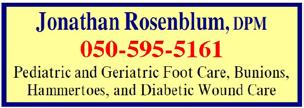
Katamon - Hagdud Haivri: 4 rooms, 3 exposures, full of light, 9 steps to apt, car park, immedate 3,980,000NIS
Katamon - Near shteiblach, 4 room apt., 1st floor, well kept, bright, 3 exposures, parking
We are a young senior couple looking for a 1 bedroom furnished apartment in Jerusalem from December 2021-June 2022
Gdud Haivri - 4 rooms, for renovation, 3 exposures, 9 steps to apt., car park, immediate
0524419731
Greek Colony - 4 rooms, renovated, 3rd floor, succa balcony, elevator, car park. 4.6 million nis
Gdud Haivri - 4 rooms, for renovation, 3 exposures, 9 steps to apt., car park, immediate

052-2639702 | www.shneller.co.il
052-2639702 | www.shneller.co.il
Shiffy@shneller co.il
44 TORAH TIDBITS 1524 / MATOT-MASEI
for
for
rent
sale
Shiffy@shneller co.il
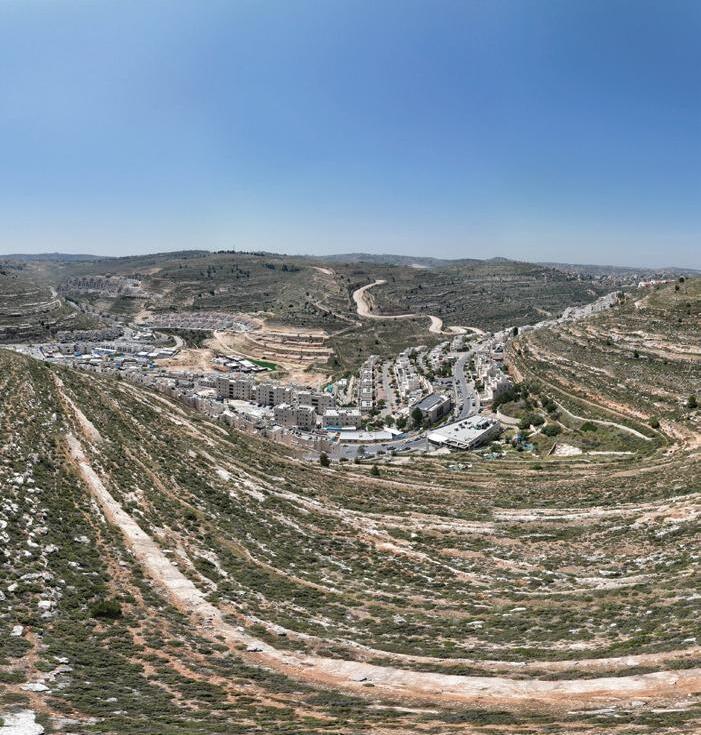
OU ISRAEL CENTER 45
OU KASHRUT PAGE
BY RABBI EZRA FRIEDMAN Director, The Gustave & Carol Jacobs Center for Kashrut Education

Introduction to Bishul Akum
The prohibition
Bishul Akum #3: Qualification
According to Biblical law, food that is completely kosher and cooked by a nonJew is permitted. However, our Sages decreed that such food, even when cooked in kosher utensils, is prohibited for consumption. This prohibition is known as bishul akum. In the coming weeks we will discuss the parameters of this rabbinic prohibition, including the reasons behind the decree, when it applies, and the practical halacha for modern industrial kashrut.
Food is a very connecting element in every society. That is the basis behind the decree of bishul akum. Our Sages were very concerned about close relationships with non-Jews since intermarriage is a very severe transgression. The prohibition effectively limits Jews and gentiles dining with each other, although there is no specific prohibition against dining with a non-Jew per se. (See Rashi on Avodah Zara 31:b.)
Forbidding the non-Jew’s cooking would be enough to create an emotional distance such that families wouldn’t marry into each other.
Rabbeinu Tam (Tosfot Avodah Zara 38:a) and Rambam (Ma’achalot Asurot 17:9)
Our sages prohibited eating kosher food cooked by a non-Jew. As mentioned in previous articles, there are two main reasons behind this prohibition. The Talmud (Avodah Zara 36:b) states that consuming kosher food cooked by non-Jews may cause unnecessary mingling and lead to the severe transgression of intermarriage. The decree of bishul akum is meant to maintain distance between both parties in order to avoid transgression. The other reason for this decree is the possibility that a non-Jew would purposely mix in non-kosher food when cooking or do so accidently due to the non-Jew’s lack of awareness of kosher. Authorities dispute whether all types of non-Jews are included in the decree of bishul akum . A halachic difference between non-Jews relates to their religious beliefs. According to some authorities, only non-Jews that practice polytheism or paganism (the belief in more than one deity) are included in the decree of bishul akum. This would include Christians and certain Asian religions. This halachic opinion is explained by the Mateh Yonatan (YD 112:1) who relates that the Talmud’s main
maintain that the decree is based on this issue of closeness to non-Jews that could lead to intermarriage; this is the opinion of most early authorities. However, Rashi and others attribute a different reasoning to the prohibition of bishul akum, which is that non-Jews might mix non-kosher ingredients into the kosher food. In future articles we will discuss whether the parameters of bishul akum are based on both of these reasons or just one. However, it is clear from numerous sources that the danger of intermarriage is the main reason behind the prohibition (See Torat Habayit 3:7).
concern is not just intermarriage but the eventual service of idol worship or in halachic terms Avodah Zara. Based on this view, there would be no concern having kosher food cooked by a Muslim as they practice monotheism. However, the overwhelming opinion is that all types of nonJews regardless of religious belief qualify for the decree of bishul akum. As such, one may not eat kosher food cooked by any non-Jew including Muslims (Pri Megadim YD 112:2, Responsa Avnei Nezer YD 92).
The decree is binding regardless of the reason
Since the transgression of intermarriage was the primary concern behind our Sages’ decree, their goal was to powerfully discourage the possibility of developing emotional connections to non-Jews that could lead to intermarriage either in that generation or the next. Accordingly, early authorities discuss whether the prohibition of bishul akum still applies even in situations where intermarriage is not technically possible. For example, Rashba, in his responsa (1:248), examines the case of food cooked by a priest. Being that Catholic priests do not marry nor do they have children with whom to intermarry, is it permitted to eat food cooked by a priest even though the reason for bishul akum seemingly does not apply to
In halacha, there are certain cases where Jews are prohibited from marrying other Jews. For example, a kohen may not marry a divorcee or the daughter of a Jewish mother and non- Jewish father (see Shulchan Aruch EH 4:5). Another example would be a mamzer (the child of certain illicit relationships). The most common mamzer today is a child born to a woman who had relations outside of wedlock. The Torah permits mamzers to solely wed other mamzers, or alternatively converts. The question arises if marrying a mamzer (or their offspring) is prohibited, would there be a prohibition to eat from food cooked by a mamzer due to bishul akum? In Sefer Cheker Halacha (Bishulei Akum 2:1, this matter is discussed and the ruling is very clear cut. Even though the main reason behind the decree is to prevent intermarriage, the decree only relates to non-Jews. As such, even in a case of illicit Jewish
46 TORAH TIDBITS 1524 / MATOT-MASEI
TORAH TIDBITS 1516 / BAMIDBAR
Kashrut Questions in Israel?


Call or Whatsapp Rabbi Friedman at 050-200-4432
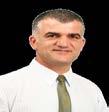

The
is
marriages, there is no prohibition of bishul akum. As such kosher food prepared by a mamzer is permitted for non-mamzers.
director. him? Rashba answers that we have a rule regarding rabbinic decrees: even when the reason does not apply, the prohibition still stands. This is a necessary element in every rabbinic prohibition. Otherwise, Rashba explains, people could rationalize and find reasons why any decree should not apply in their particular situation. Accordingly, Rashba concludes that even food cooked by a Catholic priest has the prohibition of bishul akum. A similar ruling is made by Ramban (Avodah Zara 35:a) regarding non-Jewish royalty who, because of their stature, are prohibited from marrying Jews. He maintains that the fact that the non-Jews are royalty is irrelevant, and that the decree of bishul akum stands regardless of the reason behind it. Taz (YD 112:1) , Shach (YD 112:4) and Pri Megadim (YD 112:1) cite these rulings as axioms of the laws of bishul akum
him? Rashba answers that we have a rule regarding rabbinic decrees: even when the reason does not apply, the prohibition still stands. This is a necessary element in every rabbinic prohibition. Otherwise, Rashba explains, people could rationalize and find reasons why any decree should not apply in their particular situation. Accordingly, Rashba concludes that even food cooked by a Catholic priest has the prohibition of bishul akum. A similar ruling is made by Ramban (Avodah Zara 35:a) regarding non-Jewish royalty who, because of their stature, are prohibited from marrying Jews. He maintains that the fact that the non-Jews are royalty is irrelevant, and that the decree of bishul akum stands regardless of the reason behind it. Taz (YD 112:1) , Shach (YD 112:4) and Pri Megadim (YD 112:1) cite these rulings as axioms of the laws of bishul akum.
Another proof of this point is cited by later authorities relating to the matter of a convert in regards to bishul akum. There are cases where a non-Jew converts to Judaism but his children remain non-Jewish. Later authorities (see Bein Yisrael La’amim 5:9) were asked if one may eat from kosher food cooked by a convert whose kids remain nonJews. The halacha states that even though it’s prohibited to marry a convert’s children who are not Jewish, there is no prohibition to consume food cooked by such a convert.
Other examples
Other examples
Later authorities discuss similar cases where the logic behind bishul akum may not apply. Responsa Shevet Kehati (6:273) rules that even food cooked by a non-Jewish child is considered bishul akum, despite the fact that the chances of marriage seem remote. The same is true for food cooked in a faraway country where Jews cannot travel -- bishul akum still applies.
Later authorities discuss similar cases where the logic behind bishul akum may not apply. Responsa Shevet Kehati (6:273) rules that even food cooked by a non-Jewish child is considered bishul akum, despite the fact that the chances of marriage seem remote. The same is true for food cooked in a faraway country where Jews cannot travel -- bishul akum still applies.
In summary:
Our Sages prohibited food cooked by
In summary: Our Sages prohibited food cooked by
gentiles, even if the ingredients and utensils are kosher.
gentiles, even if the ingredients and utensils are kosher.
The reason cited by most authorities is the risk of intermarriage.
The reason cited by most authorities is the risk of intermarriage.
This is because the rabbinic decree of bishul akum relates only to non-Jews. Bishul Akum was never instituted in relation to Jews and as such there can never be bishul akum by a Jew under any circumstance regardless of similarity to the original decree.
Even in cases with virtually no risk of intermarriage, the food is still prohibited, including non-Jewish royalty, priests, young children, and non-Jews from distant lands.
In summary:
All non-Jews regardless of belief are included in the decree of bishul akum including Muslims.
Even in cases with virtually no risk of intermarriage, the food is still prohibited, including non-Jewish royalty, priests, young children, and non-Jews from distant lands.
A non- mamzer can eat kosher food cooked by a mamzer.
There is no prohibition to eat kosher food cooked by a convert even if his or her children remain non-Jews.
90m, beautifully renovated, master suite, balcony, storage,
90m, beautifully renovated, master suite, balcony, storage, Shabbat elevator, private parking 3,250,000 NIS

elevator, private parking 3,250,000 NIS
BAKA: New 4 room apartment in a new building, 88m, master suite, storage, Shabbat elevator, private parking, 3,950,000 NIS
BAKA: New 4 room apartment in a new building, 88m, master suite, storage, Shabbat elevator, private parking, 3,950,000 NIS


RECHAVIA: 4-room apartment, 92m, Suka balcony, Shabbat elevator, fully accessible, private parking, storage 4,400,000 NIS
RECHAVIA: 4-room apartment, 92m, Suka balcony, Shabbat elevator, fully accessible, private parking, storage 4,400,000 NIS
ARNONA: 5-room apartment, 120m, balcony, elevator, fully accessible, private parking, storage 4,350,000 NIS
ARNONA: 5-room apartment, 120m, balcony, elevator, fully accessible, private parking, storage 4,350,000 NIS
BAKA: 5-room garden apartment, 140m, master suite, private parking, storage, full of light, airy, nice garden, 5,000,000 NIS
BAKA: 5-room garden apartment, 140m, master suite, private parking, storage, full of light, airy, nice garden, 5,000,000 NIS
OLD KATAMON: Spacious new 5-room penthouse, 155m, terrace, great panoramic view, underfloor heating, Shabat elevator, 2 parking, + rental unit, 8,900,000 NIS
OLD KATAMON: Spacious new 5-room penthouse, 155m, terrace, great panoramic view, underfloor heating, Shabat elevator, 2 parking, + rental unit, 8,900,000 NIS
FOR RENT: BAKA: nice 4-room apartment, 82m, beautifully renovated, master suite, air conditioners, balcony, 2nd floor, elevator - fully accessible, storage, 8,000 NIS
FOR RENT: BAKA: nice 4-room apartment, 82m, beautifully renovated, master suite, air conditioners, balcony, 2nd floor, elevator - fully accessible, storage, 8,000 NIS
OU ISRAEL CENTER 47
OU ISRAEL CENTER 53
.
OU Israel Gustave & Carol Jacobs Center for Kashrut Education was created to raise awareness and educate the public in all areas of kashrut. Rabbi Ezra Friedman, Deputy Rabbinic Administrator for OU Kosher Israel
the Center's
Kashrut Questions in Israel? Call or Whatsapp Rabbi Friedman at 050-200-4432 Meir Golan 077-2050015 052-2678749 golanechasim@gmail.com Meir Golan Old Katamon: 4-room apartment in a small and quiet street sqm, renovated, very bright and airy, master bedroom, Safe (mamad), sukkah balcony, view, elevator, 3,400,000 NIS Old Katamon: 4-room apartment, 90 sqm, well split, bright, airy, sukkah balcony facing a magnificent panoramic view, 3 exp Shabbat elevator, parking, 3,290,000 NIS Old Katamon: Spacious 3-room apartment in a very quiet street, 75 sqm, sukkah balcony facing a green and pastoral view, 3 exp. Shabbat elevator, private parking, storeroom, 2,690,000 NIS RASCO: new 4 room apartment, 95m, master suite, elevator, balcony, very nice view 2,950,000 NIS
: 4-room apartment,
ARNONA
OU ISRAEL CENTER 53
The OU Israel Gustave & Carol Jacobs Center for Kashrut Education was created to raise awareness and educate the public in all areas of kashrut. Rabbi Ezra Friedman, Deputy Rabbinic Administrator for OU Kosher Israel is the Center's director.
Kashrut Questions in Israel? Call or Whatsapp Rabbi Friedman at 050-200-4432 Meir Golan 077-2050015 052-2678749 golanechasim@gmail.com Meir Golan Old Katamon: 4-room apartment in a small and quiet street, 101 sqm, renovated, very bright and airy, master bedroom, Safe room (mamad), sukkah balcony, view, elevator, 3,400,000 NIS Old Katamon: 4-room apartment, 90 sqm, well split, bright, airy, sukkah balcony facing a magnificent panoramic view, 3 exp Shabbat elevator, parking, 3,290,000 NIS Old Katamon: Spacious 3-room apartment in a very quiet street, 75 sqm, sukkah balcony facing a green and pastoral view, 3 exp. Shabbat elevator, private parking, storeroom, 2,690,000 NIS RASCO: new 4 room apartment, 95m, master suite,
balcony, very nice view 2,950,000 NIS
elevator,
apartment,
ARNONA: 4-room
Shabbat













3 rd Temple
ישילשה שדקמה תיב thirdtemple.org

“FOR ZION’S SAKE I WILL NOT KEEP SILENT, FOR JERUSALEM’S SAKE I WILL NOT REMAIN QUIET”


Israel Is Forever - Moreshet Jacques Kupfer & 3rd Temple Invite you at the










March of Tisha Beav night




Around the walls of our eternal, indivisible and sovereign Capital
Wednesday 26th of July, 9 Av
Independence Garden, Agron street, Jerusalem
20:45 | Megilat Ekha

21:45 | Starting the March
New Gate, Damascus Gate, Herod’s Gate, Lions’ Gate (speeches), Dung Gate, Kotel
















































Participation of Public personalities
Do you support the establishment of the Third Temple? Scan the bar code and sign the petition




 BY RABBI MOSHE TARAGIN R am, Yeshivat Har Etzion
BY RABBI MOSHE TARAGIN R am, Yeshivat Har Etzion

Our Borders Are Alive
We had heard fabled stories about a magical Land which our ancestors had once inhabited. We had heard that the Land of Hashem, earmarked for His chosen people, flowed milk and honey. Finally, after a forty-year detour, as we stood at the doorstep of Israel, our divine gift was unwrapped. We finally learned of the boundaries of our long-awaited homeland.
Typically, borders are easily sketched by assigning four coordinates. Once the North, South, East and West coordinates are mapped, straight lines can be drawn, connecting them to form boundaries.
Yet the borders of Israel are elaborately described in a lengthy section of thirteen pesukim in parshat Matot. The boundaries of Israel aren’t straight lines, but veer and curve, excluding some spaces and incorporating others. Moreover, the curving of Israel's borders is described in human-like terminology: לובגה םכל בסנו -the boundary "retreated" , traveling in a reverse direction. Or הנרפצ לובגה אציו - the boundary (along the northern border) "departed" from the location of Tzedada, making its course to a place called Zifrona. A third example of the personification of Israel's borders is the phrase לובגה דריו םפשמ the eastern boundary "descended"
from a location called Shefam Harivlah. The boundaries of Israel are described as if they were alive, bobbing and weaving their way across the region. These clumsy and irregular boundaries are animate and alive!
AUTONOMY
Typically, boundaries are fixed by human events such as wars, political decisions, or ethnic shifts. Once set, borders typically last until subsequent wars and revolutions redraw the maps. Boundaries are a product of human history, shifting with the ebb and flow of history.
םדא ינבל ןתנ ץראהו Hashem relinquished this planet to humans, and ever since, we have been busy parceling and partitioning it into different sizes and shapes.
Unlike other territories, though, the Land of Israel isn’t subject to human influence. As the first Rashi in the Torah underscores, this country is Hashem's Land, and He delivers it to whom he sees fit. For this reason, the country wasn’t doled out to the tribes though human apportioning, but was allocated purely through a divine lottery or לרוג . Lands were awarded solely based upon divine discretion, without any human role. Stressing the lack of human agency, the Torah announces תאז הלחנב םכל לפת רשא ץראה this is the Land which will "fall" to you. The Land literally descended from Heaven without any human intervention or involvement. Israel lies beyond human reach and beyond
50 TORAH TIDBITS 1524 / MATOT-MASEI GEULAS YISRAEL
human manipulation.
Throughout history, all "human" efforts to settle this Land or to colonize it were futile. This insubordinate Land with a "mind of its own" thwarted any settlement or any occupation. For this reason, the borders of Israel are portrayed as if they were animate, possessing their own will. Most lands on planet Earth passively admit human cartography. By contrast, Israel's boundaries are alive, making their own autonomous decisions. They come from above.
HIKING THE BOUNDARIES
Though the boundaries of Israel do not respond to history, they do respond to Jewish settlement. Though Hashem predetermined all the boundaries of Israel, He tasked us with marking some of them. Toward the northwestern tip of the country, we were expected to "denote" the portion which ran from the Mediterranean sea to one of the seaside cliffs known as Hor Hahar: ררה רה םכל ואתת לודגה םיה ןמ. Likewise, we were to signal a northern section of the eastern border: םתיואתהו המפש ןניע רצחמ המדק לובגל םכל. Instead of presenting these borders as an established fact, Hashem directs us to "identify" them by residing within them. Though the boundaries of Israel resist any human convention, they do bend to Jewish presence. When we settle our Land, our boundaries react.
This interaction between Jewish presence and the boundaries of Israel began centuries earlier. Soon after his arrival in Israel, Avraham was guaranteed that his descendants would be as plentiful as the dust of the earth, and furthermore,
that Land would be awarded to him as far as the eye could gaze. Yet it wasn’t sufficient for Avraham to gaze upon the Land, he was also instructed to travel it. His cross-country trek carved out eternal boundaries.
Only Jewish presence determines the boundaries of the Land promised to us by Hashem. Though the boundaries refuse any human imposition, they do submit to Jewish settlement.
MUDDLED BORDERS
Over the past two thousand years, during our absence from Israel, its boundaries became muddled. This Land, so elegantly shaped, was often tastelessly pasted onto neighboring countries, completely obliterating its graceful contours. Sometimes our Land was annexed to modern day- Jordan, while other times it was attached to areas of current day Iraq and Syria. Without Jewish presence marking its boundaries the Land lost its borders, its autonomy, and its grace.
Not surprisingly, as we began migrating back to Israel in the late 19th century and early 20th century our long-lost borders began to reappear. In the first half of the century these borders, which for so long had been blurred, slowly started to reemerge. In 1947, under the auspices of a UN vote, some, but not all, of these borders emerged. After thousands of years of borderlessness the Land once again took its shape.
As the century wore on these borders began to shift in response to rallying Jewish presence. The more we settled our Land the more our borders expanded. The Talmud likens our country to a deer:
OU ISRAEL CENTER 51
Just as a deer's hide expands to contain its growing body, similarly the smallish land of Israel expands to admit waves of Jews who return to her. The borders of Israel are dynamic, and their size and shape depends upon our desire to live within them, in our Land.


Over the past fifty years we have been racing against time and against international diplomacy to set the borders of
our country. It is obvious that we, and we alone, will, ultimately, mark the boundaries of the Land of Hashem. Once again, as in days of old, our boundaries are jagged and circuitous, as we struggle with history. The struggle continues, but the conclusion is foregone הבגנו הנפצ המדקו המי תצרפו. It may take some time, but the borders are on our side. They do not take orders from history. Only from us.

52 TORAH TIDBITS 1524 / MATOT-MASEI





OU ISRAEL CENTER 53 ORDER ONLINE AND GET THE PRODUCTS YOU PREFER DELIVERED STRAIGHT TO YOUR DOOR! ORDER TODAY AND ENJOY SUPERIOR QUALITY, SELECTION AND SERVICE! Use coupon code welcome2ftf and save 5% off your first order! www.FarmToFamily.co.il Netanel 050-344-6261 | Office 058-444-6260 American Service! Want to shop from the convenience of your home? American Products & Specialty Items! Top quality, organic & regular Mehadrin produce Gilinski Real Estate gilinski.co.il Arnona New! Ranging 90-115 SQM w/elevator, parking & Sukkah balcony. Tailored plans available #050-7225694 3,100,000 NIS Old Katamon Penthouse, 3rd floor, 4.5R, 180 SQM, parking, storage, in need of renovations. #052-6503348 Baka 3.5R, 78 SQM, 1st floor, parking, great condition! Building in process of “pinui binui ” #052-6503348 7,200,000 NIS
SIMCHAT SHMUEL
BY RABBI SAM SHOR Program Director, OU Israel Center

This Shabbat we bless the new month of Chodesh Av, or as our tradition refers to this month, the month of Menachem Av.
Rabbi Moshe Wolfson, shlita, wrote that in addition to the tragedies that have befallen Am Yisrael during these three weeks, that there are actually two great events which are said to occur during these days. Rav Wolfson suggests that it is on the 17th of Tamuz, when Boaz marries Rut, hence setting into motion the birth of David Hamelech, from whom Mashiach will be descended. So too, our tradition teaches us that Mashiach will be born on Tisha B'Av. Rav Wolfson,suggests therefore, that these three weeks are in their essence days of great joy and anticipation. However those great lights of hope, have been covered over and clouded by the darkness and tragedies which have subsequently come to be associated with these days. The work of these three weeks is to strive to uncover those great lights.
The second of our two parshiyot this week, Parshat Masei recalls for a second time the passing of Aharon HaKohen,and tells us that the date of his passing was Rosh Chodesh Av.
And Aharon died there, during the fortieth year after Bnai Yisrael went forth from the land of Egypt, in the fifth month on the first of the month.
So, we must ask,why does the Torah specify the exact date of Aharon's passing, a detail that is not elaborated upon for any of the Avot or Imahot, or for Moshe Rabbeinu? Why is the date of Aharon's passing mentioned
here in this second account, and not in the earlier account of his passing which we read of a few weeks ago in Parshat Chukat? Why is the date of his passing specified now, in the midst of describing the journeys of the Jewish people in the wilderness?
Rabbi Shlomo Zalman Horowitz, the Patiker Rav zy'a, suggests that there is an eternal message to be gleaned from the date of Aharon's passing being both revealed during the verses which describe the extended wanderings of the Jewish People in the wilderness, as well as the actual date of Rosh Chodesh Av.
Aharon, as we know, represents the ultimate Ish Shalom, the great peace-maker and unifier of the Jewish People. The Jewish People, as we know, will experience an extended reality of wandering that will occur following the destruction of the Beit HaMikdash, which of course we commemorate, during the nine days, beginning with Rosh Chodesh Av. As we begin these days of reflection of the destruction and absence of the Beit HaMikdash, we also recall the life and legacy of Aharon HaKohein, whose legacy we must work to emulate , which will form the foundation to re-building the Beit HaMikdash.
The work of these three weeks is the work of repairing the world, one kind deed, one friendship, one mitzvah, one tefila at a time.
Yehi Ratzon, may we be blessed to use these days wisely, to do much good, to reveal those great lights, and bring about that brighter tomorrow.
54 TORAH TIDBITS 1524 / MATOT-MASEI


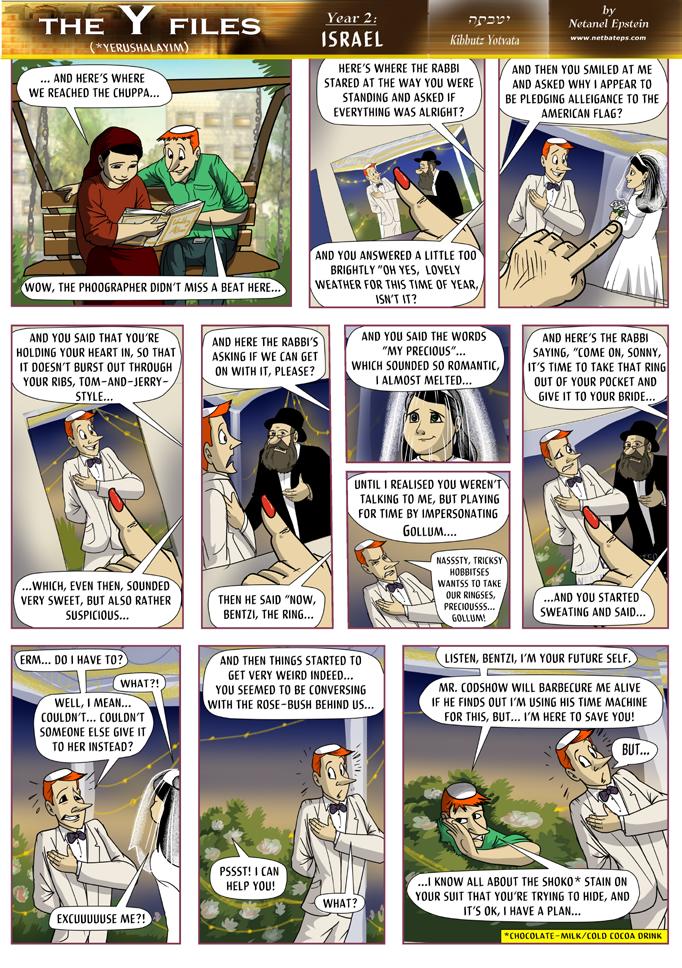
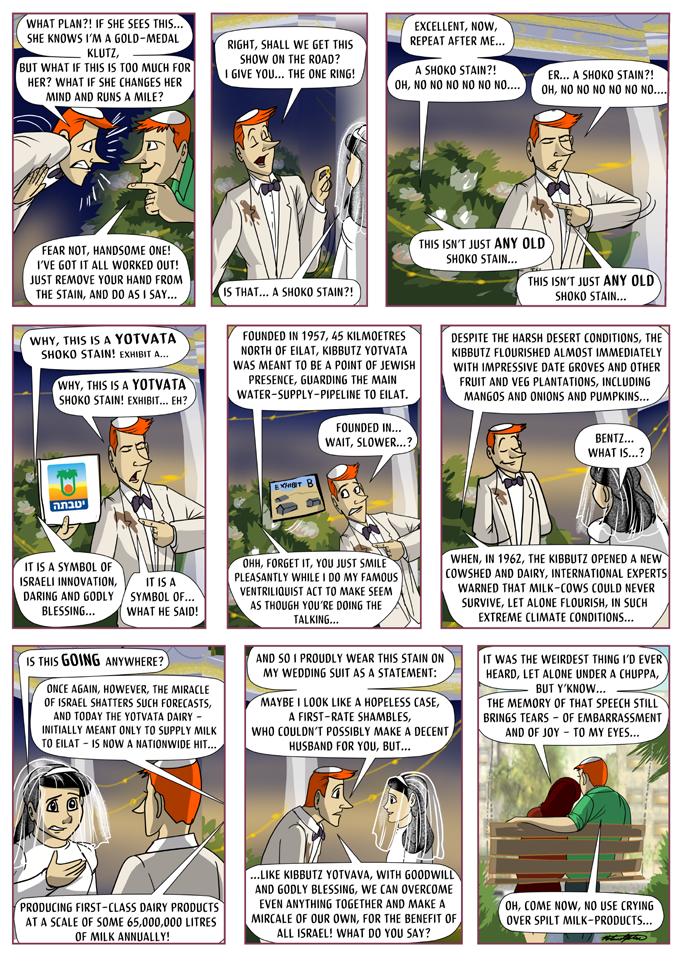
Liana Katz
Liana Katz
Hometown:
Liana Katz
Dinah Poyurs
Hometown: New Rochelle, NY Community:
Hometown:
JLIC Jerusalem
New Rochelle, NY
Community:
New Rochelle, NY Community: JLIC Jerusalem






Johannesburg, South Africa
harm. Tzaraat is known to be a highly contagious affliction, and the Kohen must diagnose it quickly in order to prevent it from spreading to others.
harm. Tzaraat is known to be a highly contagious affliction, and the Kohen must diagnose it quickly in order to prevent it from spreading to others.
harm. Tzaraat is known to be a highly contagious affliction, and the Kohen must diagnose it quickly in order to prevent it from spreading to others.
JLIC Jerusalem
JLIC Jerusalem
I am currently a student at the Hebrew University of Jerusalem studying Biomedical Science.
“interpreters” because they in essence said, “If our father had a son, we would not have spoken–because he would have the inheritance”; and “pious” because they did not want to marry men who were not worthy.
I am currently a student at the Hebrew University of Jerusalem studying Biomedical Science.
I am currently a student at the Hebrew University of Jerusalem studying Biomedical Science.
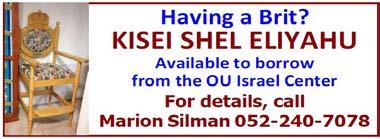






Speak Up: Daughters of Zelophehad Version
Growing Together: The Kohen’s Role in Community Development
In Parshat Matot, we are faced with an inheritance system that excludes women.
Growing Together: The Kohen’s Role in Community Development
Growing Together: The Kohen’s Role in Community Development
The Sifrei Bamidbar (133:1-4) extrapolates that when the daughters of Zelophehad heard that the land was to be apportioned to the tribes and not to females, they united in purpose and declared: 'Not as the mercies of flesh and blood are the mercies of the Lord. The mercies of flesh and blood are greater for males than for females. Not so the mercies of He who spoke and brought the world into being. His mercies are for males and females equally. His mercies are for all!' As it is written in (Psalms 145:9), 'The Lord is good to all’.
The Midrash calls sefer Vayikra “Torat HaKohanim”, the Law of the Kohanim. It is the Kohen who brings korbanot and is active in the daily functioning of the Mishkan and Beit Hamikdash. This all amounts to a common theme of the Kohen handling activities of purification. In Parashat Tazria, however, we see that the Kohen is responsible for the entire process of tzaraat, starting from the diagnosis and declaration of impurity throughout the purification process. While the Kohen’s role in purification is clear, his role in pointing out the impurities in the metzora is peculiar.
The Midrash calls sefer Vayikra “Torat HaKohanim”, the Law of the Kohanim. It is the Kohen who brings korbanot and is active in the daily functioning of the Mishkan and Beit Hamikdash. This all amounts to a common theme of the Kohen handling activities of purification. In Parashat Tazria, however, we see that the Kohen is responsible for the entire process of tzaraat, starting from the diagnosis and declaration of impurity throughout the purification process. While the Kohen’s role in purification is clear, his role in pointing out the impurities in the metzora is peculiar.
On the other hand, in Masechet Arkhin (15b), it states that the Kohen who diagnoses tzaraat is actually performing a mitzvah, as it says in Vayikra 14:2, “This shall be the law (הרות) of the metzora on the day of his purification”. The Talmud explains that the word “torah” in this passuk can also mean “teaching” or “instruction,” and thus the Kohen’s role in diagnosing tzaraat is really providing instruction to the person on how to improve themselves and become pure again.
The Midrash calls sefer Vayikra “Torat HaKohanim”, the Law of the Kohanim. It is the Kohen who brings korbanot and is active in the daily functioning of the Mishkan and Beit Hamikdash. This all amounts to a common theme of the Kohen handling activities of purification. In Parashat Tazria, however, we see that the Kohen is responsible for the entire process of tzaraat, starting from the diagnosis and declaration of impurity throughout the purification process. While the Kohen’s role in purification is clear, his role in pointing out the impurities in the metzora is peculiar.
The Ramban, in his commentary on Vayikra 13:2, explains that the Kohen’s role in diagnosing the metzora is a preventative measure aimed at protecting the community from
The Ramban, in his commentary on Vayikra 13:2, explains that the Kohen’s role in diagnosing the metzora is a preventative measure aimed at protecting the community from
The Ramban, in his commentary on Vayikra 13:2, explains that the Kohen’s role in diagnosing the metzora is a preventative measure aimed at protecting the community from
This was their petition to Moshe and when posed to God the response was that if a man had no sons, daughters could inherit his land. The daughters of Zelophehad are granted their request and according to the Talmud (BT Bava Batra 119b), Zelophehad’s daughters were wise (chachamot), astute interpreters (darshanyiot), and pious (rachmanyiot): “wise” because they spoke in the precise moment when the decision was issued;
On the other hand, in Masechet Arkhin (15b), it states that the Kohen who diagnoses tzaraat is actually performing a mitzvah, as it says in Vayikra 14:2, “This shall be the law (הרות) of the metzora on the day of his purification”. The Talmud explains that the word “torah” in this passuk can also mean “teaching” or “instruction,” and thus the Kohen’s role in diagnosing tzaraat is really providing instruction to the person on how to improve themselves and become pure again.
On the other hand, in Masechet Arkhin (15b), it states that the Kohen who diagnoses tzaraat is actually performing a mitzvah, as it says in Vayikra 14:2, “This shall be the law (הרות) of the metzora on the day of his purification”. The Talmud explains that the word “torah” in this passuk can also mean “teaching” or “instruction,” and thus the Kohen’s role in diagnosing tzaraat is really providing instruction to the person on how to improve themselves and become pure again.
What earned the daughters of Zelophehad praise and reverence, considering the societal context in which they lived, and what enduring impact does their act of speaking up hold in terms of empowerment and social change?
To gain a better understanding of the true courage of Mahlah, Noah, Hoglah, Milcah, and Tirzah - yes, their names are mentioned - it is essential to look at the context in which their story takes place.
The Sfat Emet on this parsha similarly suggests that the Kohen’s role in the tzaraat process is not merely to identify the problem but to offer an opportunity for self-reflection and growth. The Kohen helps individuals recognize their weaknesses and enables them to grow and improve. This concept is also discussed in Mishna Avot chapter 6, where it states that true gratitude is acquired through the attribute of “Ohev Et HaTochechot”loving rebuke. This means that individuals should not deny their faults but should recognize them as an opportunity for growth and development.
The Sfat Emet on this parsha similarly suggests that the Kohen’s role in the tzaraat process is not merely to identify the problem but to offer an opportunity for self-reflection and growth. The Kohen helps individuals recognize their weaknesses and enables them to grow and improve. This concept is also discussed in Mishna Avot chapter 6, where it states that true gratitude is acquired through the attribute of “Ohev Et HaTochechot”loving rebuke. This means that individuals should not deny their faults but should recognize them as an opportunity for growth and development.
The Sfat Emet on this parsha similarly suggests that the Kohen’s role in the tzaraat process is not merely to identify the problem but to offer an opportunity for self-reflection and growth. The Kohen helps individuals recognize their weaknesses and enables them to grow and improve. This concept is also discussed in Mishna Avot chapter 6, where it states that true gratitude is acquired through the attribute of “Ohev Et HaTochechot”loving rebuke. This means that individuals should not deny their faults but should recognize them as an opportunity for growth and development.
The beginning of Parshat Matot stipulates that a husband or father possesses the authority to annul the vows made by their wives or daughters. Indicative of the prevailing societal norms of the time, this law places the power in the hands of male relatives, limiting women's agency in matters of personal vows and commitments.
While women may have possessed the ability to make vows, their authority to annul them remained exclusively within the hands of their male counterparts. Despite this inherent limitation, the daughters of Zelophehad chose to defy the prevailing norms. Fully aware that their words may hold little weight unless spoken through a man; they chose to speak up.
58 TORAH TIDBITS 1524 / MATOT-MASEI
OU-JLIC Orthodox Union Heshe and Harriet Seif Jewish Learning Initiative on Campus 70 TORAH TIDBITS 1512 / TAZRIA - METZORA
OU-JLIC
Orthodox Union Heshe and Harriet Seif Jewish Learning Initiative on Campus
TORAH TIDBITS 1512 / TAZRIA - METZORA
OU-JLIC
Orthodox Union Heshe and Harriet Seif Jewish Learning Initiative on Campus
donated by Marion & Michael Silman Ita Rochel 02-560-9125
The daughters of Zelophehad embody the extraordinary courage of women who, despite being unable to annul their vows, possessed the inherent power to make them. They serve as an enduring inspiration for JLIC Jerusalem, a community that embodies the power of courageous action.
Drawn to this remarkable narrative, I became involved, witnessing firsthand the transformative potential of speaking up as true change begins with the courage to challenge the status quo.
This is the legacy of the daughters of Zelophehad; fostering an environment where voices are empowered, barriers are shattered, and true change flourishes. It implores us to amplify our voices, despite resistance and to strive for a world where every individual's words are recognized and valued.
THIS WEEK: CAN YOU PLEASE HELP make Uriel's upcoming Bar Mitzva! He is the son of a single mother living off Bitu'ach Le'umi. Thank you so much!
Can you help?
• Checks: Make out to “Yesh Ezra”
Send to: Yesh Ezra, POB 31476, Romema, Jerusalem, 9136101


• Bank Transfer: Bank Mercantile (17), Branch 642, A/C 79747843, Yesh Ezra To obtain your tax benefit receipt, send details by Whatsapp/email.
• Credit card:
Sara at 077-820-0196
Sunday, Monday, and Wednesday (10:15am - 2:45pm)
• Website: www.yeshezra.org
Click on “Donate Now”
Inquiries:
Menachem Persoff
050-570-1067
menpmp@gmail.com
1221
Real Life Rescues
Real Life Rescues
Responding to Emergencies in Challenging Terrain: A Glimpse into United Hatzalah’s Life-Saving Efforts

EMT Saves Baby from Severe Allergic Reaction Following First Taste of Tahini
My name is Daniel Malka, and I am a volunteer EMT and the deputy head of the Maalot branch of United Hatzalah. On Monday morning, our team at United Hatzalah received a distress call regarding a motor vehicle accident. However, the location, next to Nahal Kziv, hinted at the possibility of rugged terrain, prompting some of our volunteers to deploy our allterrain vehicle (ATV) to the scene.
On a recent Tuesday morning in Jerusalem, parents were feeding their 6-month-old baby and introduced him to tahini for the first time. Within minutes, the baby developed a severe allergic reaction. The infant's parents immediately called emergency services, seeking urgent help.
Initially, we struggled to locate the accident site despite the provided address. It was at that moment when one of our dedicated volunteers decided to take the ATV into the nearby stream to conduct a thorough search. And there, amidst the challenging terrain, lay a truck that had apparently fallen down into the stream while carrying pumps. The driver was in moderate condition, exhibiting facial contusions, bleeding from the nose, mouth, and jaw area, as well as contusions on the chest and legs.
United Hatzalah volunteer EMT Shalom Klein, alerted to the emergency through his proximity alert system, sprang into action as the first responder on the scene. Arriving promptly, Shalom was confronted with a distressing sight - a baby boy with swollen lips and tongue, struggling to breathe, and covered in a worrisome rash.

Quickly springing into action, our team began providing immediate medical attention to the injured truck driver. We prioritized addressing the bleeding, administering appropriate bandaging, and immobilizing the affected areas. Given the precarious location, we utilized the winch of the ATV to ensure the patient’s safety and prevent any further descent into the wadi, as well as bring back the patient to the road.
Recognizing the symptoms as indicative of an anaphylactic shock, the volunteer knew immediate intervention was crucial. Without hesitation, he administered a life-saving EpiPen injection, delivering a dose of epinephrine to counteract the severe allergic reaction. The powerful medication quickly took effect, and the infant's breathing became less labored. The swelling in the lips and tongue began to subside, providing much-needed relief to the child.
Once the initial treatment was complete, we carefully transferred the injured individual to the waiting intensive care ambulance stationed on the road above. Our collective efforts allowed us to navigate the difficult terrain and ensure the timely transfer of the patient to a higher level of care.
As the symptoms continued to recede, the EMT monitored his condition while awaiting the arrival of a mobile intensive care ambulance. Several minutes later, the ambulance team arrived and transported the infant to the nearest hospital for further treatment and observation.
The incident near Nahal Kziv serves as a reminder of the unique challenges faced by emergency responders when accidents occur in challenging terrains. United Hatzalah, through the dedication of its volunteers, constantly strives to overcome these obstacles and provide life-saving assistance to those in need.
We are grateful for the support we receive from communities and individuals who value the importance of swift emergency response. Their contributions enable us to equip our volunteers with the necessary resources, including ATVs, to reach accident sites in remote or difficult-to-access areas.
United Hatzalah remains committed to its mission of providing emergency medical services to all, regardless of location or terrain. Together, we can continue to save lives, one challenging situation at a time.
Reflecting on the incident, Shalom emphasized the importance of having an EpiPen readily available. "It's a great thing I had an EpiPen in my medical kit," he stated. "An EpiPen can save a person's life within minutes and is a huge help for both EMTs and patients."
OU ISRAEL CENTER 59
TORAH 4 TEENS
BY TEENS NCSY ISRAEL



Dassi Zelig Madricha
Life's a Climb. But the View is Great.
In Parshat Massei, the first 49 pesukim describe Bnei Yisrael's תוסעמ, their travels. The Baal Shem Tov offers a beautiful explanation for this seeming redundancy. He says that just as in Parshat Massei we read about Bnei Yisrael's journey, so too our lives are a continuous journey. In the same way that Bnei Yisrael traveled from here to there, every Jew experiences ups and downs.
These pesukim are here to teach us a vital lesson on how to view our תוסעמ. Every stage in our life is meant to help us grow, and we should learn from each one. While Bnei Yisrael’s goal was to get to Eretz Yisrael, the Torah spends 49 pesukim explaining their journey in order to show us its importance. It's genuinely about the journey, not the destination.
There is a famous story about a mother who took her child on a difficult and treacherous journey. They spent all day schlepping on trains, taxis and walking around in the hot summer. After this long day, someone asks the child how their journey was and they respond “what journey? I was with my mother all day.”
Oftentimes we get so caught up in the minute details of our journey and reaching our destination, that we fail to see who is carrying us. The beginning of Parshat Massei reminds
us that Hashem is the One who brings us on all of our journeys and the One guiding us through them.
As we approach the nine days, let’s take a step back and try to recognize and appreciate Yad Hashem in every stage of our lives. Let’s try to see what we can gain and how we can better ourselves from where we are today. B'ezrat Hashem Tisha B'av will be a chag this year!
Aharon Rosensweig 12th Grade (Graduate)

Raanana
A New Kind of Recovery
One of the many topics that is discussed in this week's parsha is that of טלקמ ירע, cities where people who accidentally killed someone run away to live in safety - all of which belong to the Leviim along with their 42 other cities: ירע שש תא םיולל ונתת רשא םירעה תאו" ונתת
"ריע םיתשו םיעברא
This prompts the question: why were their cities specifically chosen to be the place where people go to hide?
I found an interesting answer in the םש לאומשמ - one which is more spiritual. When a man takes another man's life, he loses a part of himself – his humanity. Yet, because it was done by accident, Hashem is giving you the opportunity to recover and slowly get that life
60 TORAH TIDBITS 1524 / MATOT-MASEI
םהילעו חצרה המש סנל ונתת רשא טלקמה
WHAT ’S YOUR GENRE?
Azazel and Other Jewish Stories
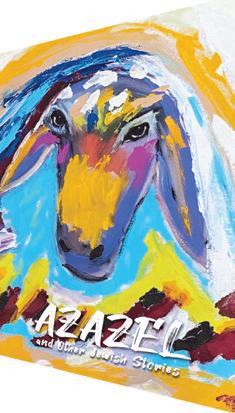
Pomerantz Book Store 02 623-5559

SherlockS Hats 02 563-7155

The Israel OU Center
back by being close to the Leviim, who have always served Hashem with a lot of energy and passion and become a source of life for the rest of the people.
This idea shows us that part of the point of טלקמ ירע was not only to provide safety for accidental killers, but to help them get better and closer to Hashem so they can make up for the part of themselves they lost.
This applies to our lives as well; when we make big mistakes, we often have a tendency to feel very bad about ourselves, as if we are not worthy of anyone's love or respect. Hashem is coming to tell us that we can get better, and we just have to work a little harder to do it.
I hope that we can all remember that even at our lowest points, we are good people and Hashem is looking out for us, and try our best to follow Him even after those mistakes.
OU ISRAEL CENTER 61
DRAMA BIBLE HORROR COMEDY HOLOCAUST Find them all in by Yaacov Peterseil
A V A I L A B L E A T :
the genre you love.
Choose
Summer with Yachad.
Alexa was unconditionally included and she finally made sincere, meaningful friendships.
Huvi became more flexible and learned to get along with others.
Sam wishes he could stay all year long. He feels an invaluable sense of normalcy and independence.
A magical space where individuals develop social skills, overcome fears, make real relationships – and feel more similar than different.

62 TORAH TIDBITS 1524 / MATOT-MASEI 212-613-8369 yachadsummer@ou.org IVDU SUMMER J.U.F OUR WAY REACH This is Yachad. Yachad_Universe Baltimore Chicago Cleveland Israel Los Angeles New England New Jersey New York South Florida Toronto



Sunday-Wednesday, July 16-19 27 Tammuz - 1 Menachem Av Three Programs That You Can Choose From: Kehilat Darchei Tzion - 4 Emek Zevulun Tuesday night, July 18 29 Tammuz English תירבע Yael Leibowitz גרבסולש לעי 19:45 Rabbi Alex Israel ןו›גרפ ישוי ר»ד 21:00 Modiin - in Hebrew and English Tanakh Evenings in Jerusalem and Modiin Herzog College’s Day and Night Herzog College's Yemei Iyun b'Tanakh Live in Alon Shvut and Online Hechal Shlomo - 58 King George Thursday night, July 20 2 Menachem Av English תירבע תינידמ תוגיהנממ הימחנ תיתרבח תוגיהנמל לסילש ירימ ר»ד 20:00 Our Journeys in the Desert: How Failure Brings Redemption Rabbi Dr. Kenneth Brander םילשוריב רחב ימ ?עודמו קזב ןונמא ברה 21:00 Restoring Foundations in the Second Temple Period Dr. Tova Ganzel ארקמה לש וסחי הכולמל ןוגרפ ישוי ר»ד 22:00 Jerusalem - in Hebrew and English For Registration and Information, see events.herzog.ac.il
R�h Hashana at the Ramada Jerusalem Hotel
A great start to the year!
Spacious rooms ◆ BEAUTIFUL GARDENS
Kashrut Supervision:
Mehadrin Jerusalem Rabbinate & Orthodox Union Glatt Kosher
Services led by Cantor Alex Holtz
Guest lecturer: Rabbi Dr. Nachum Amsel
Having a simcha on Chol Hamoed?
Celebrate in our special events sukkah

Early Birds Rosh Hashana Package:

4,900 NIS for double occupancy (instead of 5,555 NIS) Offer valid until July 14th / 25 Tammuz
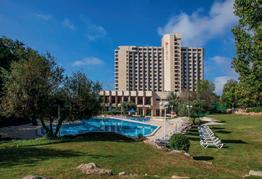
Yom Kippur Reservations:

1,800 NIS for double occupancy (Guests reserving for Rosh Hashana will receive an additional 10% discount on Yom Kippur bookings)
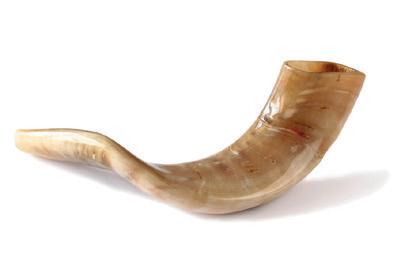
64 TORAH TIDBITS 1524 / MATOT-MASEI
Reservations call: 02-659-9950 (+972-2-659-9950) | www.jerusalemramadahotel.com | reservations@ramadajerusalem.com

























 OU EXECUTIVE VICE PRESIDENT
OU EXECUTIVE VICE PRESIDENT






















































































































































































 BY RABBI MOSHE TARAGIN R am, Yeshivat Har Etzion
BY RABBI MOSHE TARAGIN R am, Yeshivat Har Etzion






































